#this dead child justice like. it is so incredible to be how key his character is in getting why the show is the way it is
Text
the more i rewatch twin peaks i am reminded more and more that albert rosenfield (and to a lesser extent bobby briggs, though he doesn’t quite articulate it as clearly as albert with the exception of him breaking down at laura’s funeral) is THE only character to recognize laura’s death for what it was—completely avoidable, unromantic, and caused by human evil that nobody recognized the signs of or did anything to stop
#twin peaks#albert rosenfield#bobby also gets it but he is a deeply emotional struggling seventeen year old with many issues who we watch process his trauma day by#day on the show and thus has a specific emotional POV (which i think is actually incredibly well written and makes sense for his#character and relationship to the town and to laura)#meanwhile i think about the fact that one of the first major moments interpersonal conflicts set up for him is that he wants to do the#autopsy on laura and finds himself fighting with half the town—including other law enforcement officers—to just do his job and try to bring#this dead child justice like. it is so incredible to be how key his character is in getting why the show is the way it is#and then to watch fire walk with me completely tempers the way you view the show; why didn’t anyone help laura when she was alive? and why#is albert the only one to do so after her death?
1K notes
·
View notes
Text
Blind Betrayal: In Defense of Elder Maxson
(I have no idea what prompted me to go full Elder Maxson Defense Squad late at night, but I’m having thoughts on this that won’t leave me alone, so here goes...)
Picture this.
You are Arthur Maxson.
You’re a member of a famous family line known for leadership, courage, wisdom, survival, tactical genius, accomplishing feats of glory in battle, and so on and so forth.
You are also the last member of that family line.
As a result, you have not only been saddled from birth with Expectations of Greatness, but with the terrible knowledge that if you fuck it up, you have doomed your entire bloodline to extinction and potentially placed the future of your faction - your home, family, friends, comrades, and whole way of life - in severe jeopardy.
No pressure.
You’re also twenty years old.
You were orphaned as a child and were quite shy, but you were also quite bright, creative, maybe a bit of a daydreamer. You liked to write stories and thought Liberty Prime was cool. The Scribe caste might have been a good niche for you. Unfortunately, you are Arthur Maxson, Last of His Line, and any control that you might have had over your own life has already been overridden by people older, wiser and more powerful than you. They’ve decided that you had to learn how to be a Knight and go charging into battle to perpetuate your family’s glorious reputation in combat, but also not to get yourself killed or else Your Whole Faction Is Doomed (again, no pressure).
So you learned to be a Knight, and probably got kicked up the ranks a little faster than most teenagers because not being a child prodigy was not an option for a Maxson. Luckily for you, you were able to live up to at least some of the hype, pulled off some brilliant tactical and diplomatic moves to crush Super Mutant invasions and incidentally reunite a rogue chapter, which became disillusioned on ideological grounds and left years ago, with the rest of your faction.
Nice job. Your fans will probably fill in the gaps with a little extra stardust and hype, so if you flubbed your lines once in a while, it’s probably not going into the Codex.
And now you’re Elder of the Brotherhood of Steel. Your entire faction looks to you for leadership and relies upon you for survival. You have quite a large army at your command and have cultivated an impressive reputation, and have now decided to leave your usual stomping grounds; you’ve embarked upon an ambitious campaign to liberate humanity from the sinister clutches of The Institute and the army of synths that they’re hoping to replace actual humans with. People expect nothing but complete and total victory from you. This is no time to screw things up.
(Did I mention that you’re twenty? Most guys your age are still finding their way around their Power Armor, goofing off in the barracks, chasing after girls, getting into hijinks on shore leave, and so on. But you are Arthur Maxson, and you have Responsibilities. No slack whatsoever will be cut here, and failure is not an option. If you go down, the Brotherhood of Steel falls with you and it will be your fault.)
Everything appears to be going well, the new Pre-War recruit is exceeding expectations and even grumpy Knight Rhys appears to merely resent their existence. All is going according to plan...
... until you find out that one of your men, Paladin Danse, a highly respected field officer of many years’ standing, is not what he appears to be.
You have long been impressing upon your crew the need to completely eradicate any and all synths because they are The Enemy and will destroy mankind, but one of them has infiltrated your senior command and knows all kinds of key strategic stuff about your faction, classified stuff, military intelligence, and other things that you really do not want The Enemy to know. If he’s been reporting back to them, they will soon know how to destroy your faction from the inside out.
He has also gone missing in suspicious circumstances and you think your new recruit, who was training under his wing, knows - or can at least find out - where he is. You’ve made efforts to keep this quiet while you tried to verify this intelligence with the rest of your senior officers - checking and double-checking, because holy shit, how could this have happened? This can’t be true. You don’t want it to be true. You trusted this man as a fellow officer and as a friend, and always spoke of his abilities and character in glowing terms. But this is not only a personal betrayal - it’s a professional one, with potentially far-reaching consequences. After all, how can your judgment be trusted if you confided in someone who was sent as an enemy agent to infiltrate and betray the Brotherhood? This could potentially destabilize the Brotherhood of Steel’s entire command structure and spell doom for yourself, your men, and possibly even humanity itself.
So now your faction is unexpectedly in mortal peril and the shit has hit the fan. Word has gotten out about this revelation and people are talking. Whispering, in fact. All the while, looking to you to see what needs to be done about this problem.
It’s clear what has to be done. However much you liked Paladin Danse, he is potentially a traitor with too much important information about your faction, and he cannot be allowed to run loose - or, worse still, report back to the enemy which placed him in your midst in the first place. So you send your new recruit after him, with the strict instruction that he is to be terminated.
You are, naturally, very pissed about all this and want the problem to go away as soon as possible. A threat to the safety and integrity of your faction, which has already splintered off into rival groups once, to disastrous effect, over disagreements with the general direction and trustworthiness of its leadership, is an unacceptable existential threat. You are not about to let the Brotherhood disintegrate on your watch. You can’t. You have no choice but to keep this together.
Unfortunately, there is a problem. Danse is very sincerely professing to know nothing about his true identity and claims to have always served the Brotherhood with unfailing loyalty. Your new recruit is inclined to believe him and is refusing to follow through on their mission objective.
You have no idea if he is telling the truth, or if he has been programmed to say this convincingly - so much so that he possibly even believes it himself. You are most likely incredibly pissed off by this whole situation, but there are greater things at stake here.
Like humanity’s future. And your faction and family legacy not being torn apart by internal division, with great risk of harm and death to the people who rely upon you for protection, justice and their very survival.
You can order that Danse be killed and know, whatever happens, that your faction will be safe from betrayal to its sworn enemy, even if the poor guy didn’t even know that he was being sent to spy on the people he was taught to call his brothers and sisters. You are very aware that this is a horrible outcome if he proves to be an unwitting party and genuinely unaware of his origins, but also acutely aware that if you start recanting your own statements about synths being The Enemy, you run the risk of undermining your entire campaign, losing the trust and respect of your men and your senior command staff, and possibly even being deposed as Elder. You were appointed Elder after a succession of unsuccessful candidates followed in the Lyons’ wake, and it’s very likely that whoever will take over from you will be - at best - a lesser candidate, and at worst, a potentially disastrous choice who will lead the Brotherhood into ruin, despair, madness, death, etc, etc. You know damn well that weak leaders don’t last long in the wasteland, and neither do leaderless factions. This is potentially a choice between Danse’s survival, or the Brotherhood’s - you can sacrifice a single hapless soldier to appease the threat of Scylla, or opt for Charybdis to try to spare him and risk having your whole ship pulled out from underneath you, condemning yourself and countless others to a terrible fate.
Or... you’ve been given a potential out. You can declare the former Paladin dead, but spare him by way of permanent exile, upon pain of death should he ever return. Only the new recruit will know the truth. Danse will still potentially be running around as someone who Knows Too Much about the Brotherhood’s military secrets, which is obviously a less than desirable state of affairs, but he will no longer be in a position to continue to spy and report back, so that aspect of the (perceived or actual) threat has, at least, been permanently removed. This option is merciful and, if you’re really honest with yourself, you probably prefer this one because it lets you off the hook to a degree and you no longer have to kill a trusted officer and friend. However, it also requires you to assume a great deal of personal risk, particularly to your reputation as a leader. What are your men going to say if they see the “dead” guy running around the Commonwealth and it becomes clear that you have not only failed to execute a traitor, but lied about it to everybody in your faction? How are you going to explain why you refused to kill someone who was planted in your organization’s ranks by a sworn enemy?
You have to choose one or the other. You’re the leader of the Brotherhood and this is a particularly shitty dilemma which you would really prefer not to be in, but you were appointed because these kinds of impossible decisions frequently arise in times of war, and you know that effective leaders sometimes have to make deeply unpleasant choices, opting to sacrifice one man in order to protect many more.
Either way, there’s going to be a downside and you’re either going to be regarded as a complete asshole (even if people are forced to reluctantly agree that you didn’t have much choice in the matter and acted out of concern for the safety of the Brotherhood and the success of your mission), or you can risk a great deal - perhaps far too much - all for the sake of a man you’re no longer sure you can trust, because good leaders are merciful and Danse has never steered you wrong before, even though he’s had plenty of opportunity to do so in the past.
It’s a hell of a decision and not one to be made lightly, but you have to make it nonetheless. You may be twenty years old, but the world is depending on you all the same, and there’s no way out of this one. The fates of you, your men, your mission, Danse, and all of humanity are potentially at stake and riding on that one decision.
Choose wisely, Elder.
#Fallout 4#Blind Betrayal#Elder Maxson#Arthur Maxson#Paladin Danse#Danse#Fallout 4 spoilers#Brotherhood of Steel#Fallout 4 lore#between a rock and a hard place#cut Maxson some slack you guys#there's a lot riding on that decision#sometimes good leaders have to be the asshole#but I suspect that he secretly prefers being persuaded to spare Danse#even if he will never openly admit it#BoS discourse#I expect to get flamed out the ass for this one#but oh well#such is life
197 notes
·
View notes
Text
Rob Zombie; "Why it's time to step outside the confinements of his own box."
For close to four decades,
Rob Zombie has brought nonstop psychedelic grooves and a rockstar presence while gracing his own music and the silver screen with gut-churning, drug-tripping visuals. He not only commands quite the presence in films (whether his own successes or others’), but also makes appearances within many other horror soundtracks. There’s no denying that Zombie is a bloodied savant who has stayed incredibly consistent.
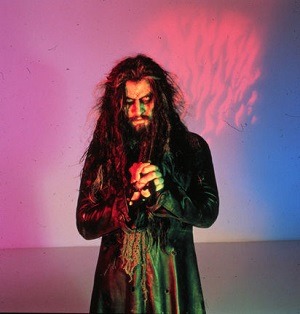
[ᴿᵒᵇ ᶻᵒᵐᵇᶦᵉ. ⁽ˢᵒᵘʳᶜᵉ: ᴳᵒᵒᵍˡᵉ ᴵᵐᵃᵍᵉˢ⁾]
(Written by Stella, edited by Jacob J.)
(Side note; tumblr’s photo formatting is a pain)
Let’s take a dive into his music before getting into his film library. From 1985-1997, White Zombie released six albums (between studio and compilations). La Sexorcisto: Devil Music Volume One didn’t break into the Billboard 200 chart until a year after its 1992 release. Shortly thereafter, it became the hot and groovy bong success of the band, going on to sell two million copies. Astro Creep 2000, their final and fourth studio release, was their first and only album to chart within the Top 10 of the Billboard 200 in 1995. Up to this day in 2020, “White Zombie” has been featured in 47 TV, film, and video game soundtracks, from Beavis & Butthead to Pen15 to Bride Of Chucky (which includes a personal favorite moment of mine), amongst many others.
After the disbandment and separation, Zombie continued on his solo journey. He has gone on to release six studio albums, with a seventh on the way in March 2021, titled The Lunar Injection Kool Aid Eclipse Conspiracy. A multitude of hits—eight to be exact—sat within the Top 10 of the Billboard 200 records.
══════════════════
Zombie’s extensive film career is a “Super Beast” on its own.
He has been very vocal about gaining inspiration from 1920s-1980s horror culture. In many interviews, he’s cited Stan Lee, Bella Lugosi, Alice Cooper, and Steven Speilberg as being responsible for molding the brain that we know today.
Some of his influences include:
George A. Romero’s Dawn of the Dead (1978)
A Clockwork Orange (1971)
Texas Chainsaw Massacre (1974)
The Cabinet of Dr. Caligari (1920)
The Shining (1980)
Zombie’s upbringing in the carnival industry alongside his family is another key influence.
[[I’ll only be focusing on Zombie’s live-action films here.]]
══════════════════
In 2000, Rob made his directorial and (very memorable) screen debut with House Of 1000 Corpses.
It took three years to be released because of quarrels with major production companies regarding the film’s majorly aggressive themes of torture, blood, violence, sex—not to mention his arrogance with MGM, fighting to get rights back from Universal. Eventually, Lionsgate bit the bullet, albeit with the major stipulation of having Rob edit it down much further so House could pass with a “tame” R rating.

[[House of 1000 Corpses: Rainn Wilson as taxidermy merman (Source: Tumblr—and if you’re brave, you can view the scene here.)]]
══════════════════
In 2005 and 2019, the franchise’s next two installments—Devil’s Rejects and 3 From Hell—were released. The franchise is heavily influenced by the shocking, sickening, and unforgettable ’70s classic Texas Chainsaw Massacre. It follows a family of psychotic, sadistic, and bloodthirsty (if I’m being honest) necrophiliacs. They kidnap, kill, torture and brutalize anyone who gets in their way. At the end of Devil’s Rejects, they somehow manage to survive a police shootout, escape prison, and waltz on into Mexico (as seen in the franchise finale 3 from Hell).
Look, it’s all complicated.
Main Characters from the franchise:
Captain Spaulding—Sid Haig
Baby Firefly—Sheri Moon Zombie
Otis B. Driftwood—Bill Moseley
Momma Firefly—Karen Black (recast as Leslie Easterbrook after Karen’s passing)
(Other notable appearances throughout: Chris Hardwick, Rainn Wilson, Danny Trejo, Dee Wallace, Ken Foree, and Diamond Dallas Page.)
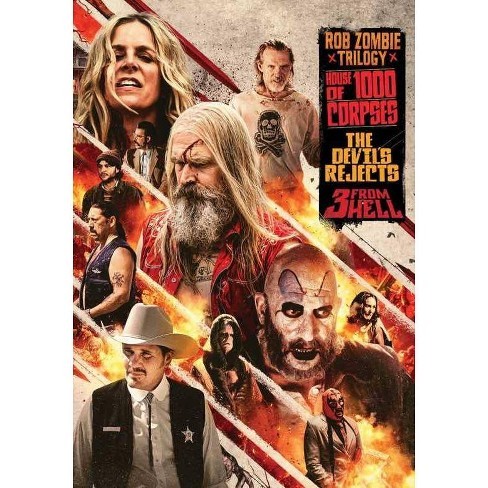
⁽“ʰᵒᵘˢᵉˢ ᵗʳⁱˡᵒᵍʸ”, ᵈᵛᵈ ˢᵉᵗ﹔ ˢᵒᵘʳᶜᵉ﹔ ᵗᵃʳᵍᵉᵗ.ᶜᵒᵐ⁾
══════════════════
The notorious/controversial Halloween (John Carpenter, 1978) remakes from 2007 and 2009.
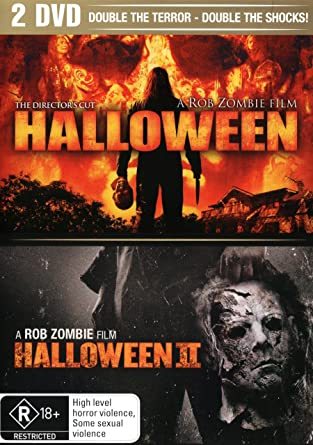
(ᵃ ᵛⁱᵉʷ ᵒᶠ ᵗʰᵉ ᵇᵒˣ ᵃʳᵗ ᶠᵒʳ ᵗʰᵉ ʰᵃˡˡᵒʷᵉᵉⁿ ʳᵉᵐᵃᵏᵉˢ ⁽ˢᵒᵘʳᶜᵉ﹕ ᵃᵐᵃᶻᵒⁿ⁾)
Look, this is a remake that you either adore or hate with a burning passion. If you’re a horror fanatic, you know what’s up with the original.
I personally adore Zombie’s take. The fact alone that he gave us an entire background story as to why Michael became the psychotic slasher that we’ve come to know and love. Plus, with an increased suspense and gore factor? Worked incredibly well and did justice (in my opinion).
The film made me feel bad for Michael, with moments of child Myers in therapy, particularly his love for making masks to pass the time while he was locked up and the touching family moments between him and his mother Deborah (Sheri Moon).
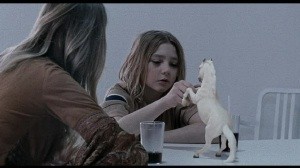
ᵈᵉᵇᵒʳᵃʰ ᵃⁿᵈ ᵐⁱᶜʰᵃᵉˡ ᵐᵉʸᵉʳˢ ⁱⁿ ʲᵃⁱˡ ᵗʰᵉʳᵃᵖʸ. ⁽ˢᶜʳᵉᵉⁿᶜᵃᵖ, ʰᵃˡˡᵒʷᵉᵉⁿ. ˢᵒᵘʳᶜᵉ﹕ ᵍᵒᵒᵍˡᵉ⁾
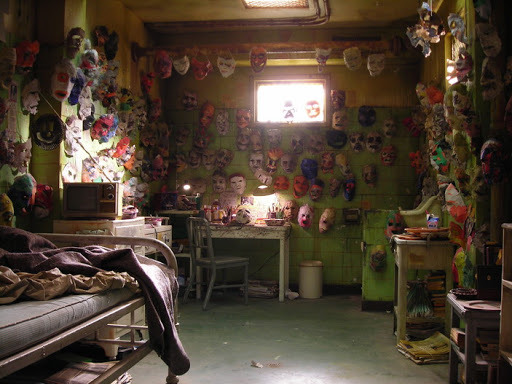
[Michael’s cell in the 2007 Halloween remake. (Source: Google)]
Add in the supporting cast of Michael McDowell (Loomis), Brad Douriff (Sheriff Leigh), Scout Taylor-Compton (Laurie Strode), etc., and I honestly think that it came together very well as a remake.
The films rated relatively low, but they did gross higher than the budgets that they originally had to film on. Again, I’m not going to give much attention to the higher-ups of critical perception—it all comes down to personal taste.
══════════════════
“Lords of Salem” (2013)
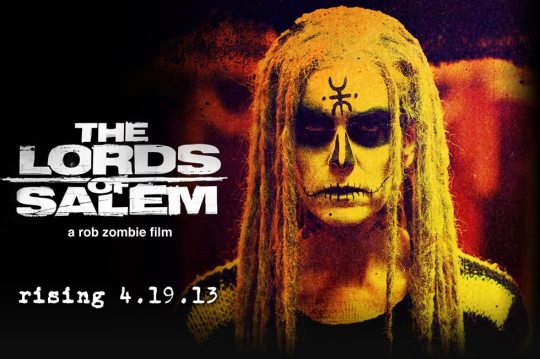
[[Promotional art for Lords of Salem. (Souce: Google Images)]]
A film that’s centered within Salem, Massachusetts,
this film—you guessed it—tackles witches, occultism, possession, Satan, and all the usual topics. Heidi (Sherri Moon) is a radio DJ who gets sent a mysterious record that’s labeled as being from “The Lords.” From then on out, shit gets a little dicey and admittedly, very disjointed. You can’t fault the cast here, and I loved the visuals that they were going for. However, with set schedule conflicts and multiple rewrites, which led to essentially running out of time to film? As a whole, what looked great on paper just couldn’t be done justice.
My FAVORITE sequence within the film (SPOILERS):
youtube
I can forgive the disjointedness solely because of how mind-boggling and brilliant the film’s history and proper visuals were. Also, we got to see Dee Wallace, Judy Geeson, and Patricia Quinn as creepy and badass witches who moonlight as Heidi’s landlords. Also Meg Foster who leads their coven? Can we talk about what a femme-fueled power cast that is?!
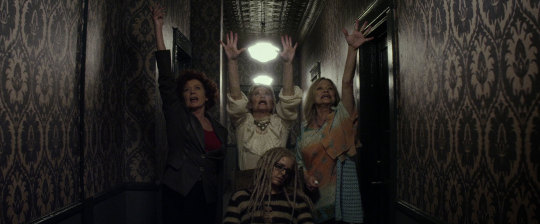
[[Left to right: Patricia Quinn as Megan, Dee Wallace as Sonny, and Judy Geeson as Lacy Doyle. (Screencap, Lords of Salem. Source: Google) ]]

[[Meg Foster as coven leader Margaret Morgan. (Screencap, Lords of Salem. Source; google)]]
Like I said prior, the film gets a little wild. If you’re...well, buzzed prior to watching, it may make a little more sense.
══════════════════
“31” (2016)
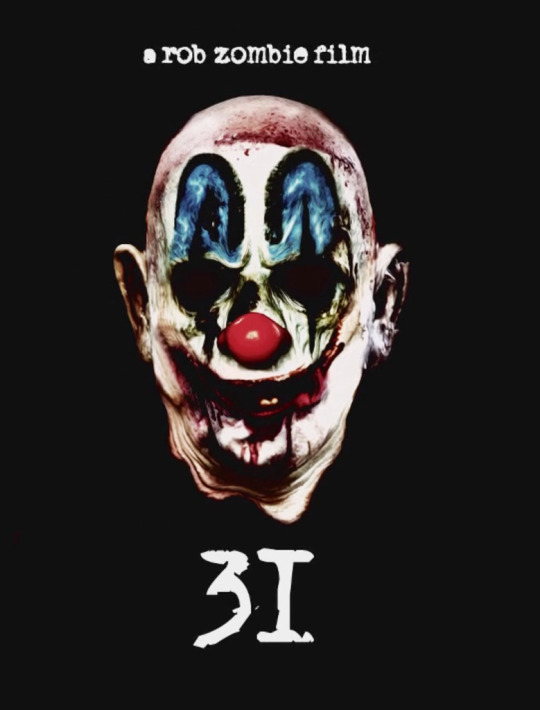
[[Film poster for 31 (Source: Google)]]
[Synopsis from IMDB; “Five carnival workers are kidnapped and held hostage in an abandoned, hellish compound where they are forced to participate in a violent game, the goal of which is to survive twelve hours against a gang of sadistic clowns.”]
Here, we clearly see that Zombie is invoking his childhood growing up within carnivals. In a 2013 interview with LA Weekly, Zombie divulged more about it:
“When we were kids, my parents would [work at the carnivals], and me and my brother would get dragged along to these things all the time and have to work.”
He went further on to say;
“Yeah, and it's not the nicest world. As a kid, you get exposed to the crazier underworld of the carnival. Me and my brother, when we were very little, we'd be inside the haunted house playing all day. So, already, what people are paying money to be scared [of], we're just playing in because it's fun. We saw the inner workings behind the machines.”
youtube
(”31″ trailer, source; Youtube)
Once again in this film, Zombie brings a powerhouse cast:
Jeff Daniel Phillips as Roscoe Pepper
Meg Foster as Venus Virgo
Malcom McDowell as Father Murder
Judy Geeson as Sister Dragon
Richard Brake as Doom Head
You can view the entire cast at IMDB here.
Set in 1976, Zombie stays true to his nods. Again, depending on taste, this is a huge hit or a wild miss with mindless homicidal violence, campiness, and climbs across the monkey bar of standards that we’re used to seeing from him.
══════════════════
So at this point, you’re probably wondering why I think that it’s time for Rob Zombie to step out of the confinements of his own box...
══════════════════
It’s no secret that Zombie sticks to only a small group of tropes:
Slashers, families or groups of homicidals that lack remorse, the occult, etc. There’s no shame in sticking to what you know. Hell, Zombie has seemingly cracked the code over the past two decades that he’s been in the film industry that so many directors still don’t seem to get.
IMO, despite whatever you personally feel about the films mentioned above- I feel like we’re living a freaky groundhog day repeat within Zombie’s filmography.
══════════════════
Now, if it ain’t broke, why fix it? Look, I’m not saying that Zombie has to change anything. However, I would love to see him tackle some other nuances that we’ve already seen from him in small doses.
- Children: We haven’t seen Zombie exactly take on what horror films depict kids as. Sure, he made a breakout and impeccable choice with young Michael Myers (Daeg Faerch) back in 2007. I personally would adore to see a reimagined (NOT remade) Children of the Corn on acid, one we all know Zombie can tackle and turn every existing view on its head.
- Witchcraft, The Occult, Satan, Voodoo: Zombie genuinely had a phenomenal concept (on paper) for 2012’s Lords of Salem. It was unfortunate that they ran out of resources and ran into unfortunate circumstances on set while filming.
The film wasn’t a total tank, though, given how inspiring and insane all the visuals were throughout the 1 hr, 41min film. I am absolutely positive that, given a full-force opportunity, Rob could rectify the mess that was out of his control. We completely saw that he provided visuals that left quite the impression, and he could take those taboo subjects by the goat horns.
- Animals (not the human form): It’s no secret that Rob and his wife Sherri are ethical vegetarians. It would be so tongue and cheek to see them take on such topics as animals getting their revenge, or even vegetarians torturing carnivores. This twist on the formula would make for an interesting viewing.
══════════════════
2.) In regard to time periods,
Zombie stays within—and pays homage to—the 1970s and 1980s quite a bit. Obviously, those are the eras that Zombie personally loves the most when it comes to filmmaking. However, it would be very interesting to see him take on current day settings.
Zombie has such a unique viewpoint. Given changing climates in politics, human decline/growth, the economy, etc., he would do work that could easily put Ryan Murphy to shame.
══════════════════
3.) He could also do with some different casting every now and then.
Let me preface this by saying that I adore every repeat casting choice that Zombie has made for his films.
Of course chemistry is a huge thing, and sticking to his friends is a very smart choice. However, he also has the potential to make new stars, boosting the power of those that may be under the radar. He can support those new stars with cameos from classic actors that we haven’t seen in awhile. I can’t begin to even fictionally cast those who fit the bill, but I do believe that with the “Zombie Touch,” he can bring so much more fresh air to the usual casting.
══════════════════
There’s no doubting what Rob Zombie is clearly very good at. Despite mixed reviews from the horror world and critics, it’s time that his fans open their eyes to new possibilities. Of course, there are die-hards, but digging your feet in further doesn’t allow the growth of horror and its ever evolving themes.
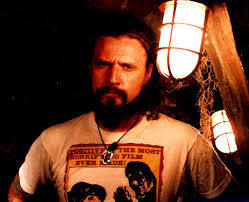
[[ʳᵒᵇ ᶻᵒᵐᵇⁱᵉ, ˢᵒᵘʳᶜᵉ﹔ ᵍᵒᵒᵍˡᵉ ⁱᵐᵃᵍᵉˢ]]
This theory has been on my mind for a very long time—since 3 from Hell came out. I’m sure, in his usual fashion, we won’t be seeing any new films from Rob anytime soon (what with his new album set to release in March 2021, not to mention the toll that the pandemic has had on Hollywood.)
Still, it never hurts to challenge the set standards and ways.
#rob zombie#zombie#sherri moon zombie#house of 1000 corpses#devils rejects#31#lords of salem#halloween#halloween remake#horror film#horror movies#horror films#retrospective#opinion#opinion piece#white zombie#torture#bloody#1970#1980#1970s#1980s horror#1970s horror#1970s aesthetic#1980s aesthetic#texas chainsaw massacre#michael myers#myers#clowns#scary clowns
5 notes
·
View notes
Text
The 100 6x10 ‘Matryoshka’
Sanctum is on lockdown and the Primes are on the verge of morality, even more so now due to Kane’s sacrifice ensuring they cannot create Nightblood. After living for hundreds of years without the fear of death because there always the promise of another body someday. Now, the future is uncertain for these immortal beings.
With no time to grieve for a man she loved, Abby then finds out that her daughter is gone too. Slapping Murphy was partly anger at herself, for letting her addiction consume her when she should have been there for Clarke. But I don’t deny that Murphy somewhat deserved it. He did betray them and help the enemy. He did do the right thing in the end, but still, he was willing to help a psychopath who stole his friends body to prevent himself from going to hell.
It’s clear that after what Raven went through with Kane and Abby, it’s put things into perspective for her. She realises that she was aiming her anger and frustrations onto others unfairly. From seeing a brief glimpse of her reaction to finding out about Clarke’s death, it’s clear how much remorse she feels for being so caught up in her own feelings that she neglected to take anyone else into consideration.
Murphy's fears of dying are understandable but living forever is not the answer to avoid going to hell. Immortality is just avoiding the issue, morality means actively doing something to prevent it.
Russell’s biggest fear is the truth getting out. It could destroy Sanctum and all they’ve built. He was one who created this society by feeding them lies, making them sacrifice their loved ones for the illusion of these ‘gods’. They’re brainwashed into believing that it’s an honour to become one with the Primes, but really it means the end of their lives. They’re body snatchers, not gods and it’s a hard truth to swallow for the people who have never known anything else. Ultimately, once the people of Sanctum know the truth, that could be the key to bringing this society down for good.
Only four Primes are left now, until a null, Ty (who Ryker told the truth to earlier) kills another. He’s angered by the fact that he’s been lied to his entire life. He wants justice for his child and wife, who were given to the forrest as sacrifices, which he now knows was all for nothing. He kills Simone, and that crushes Russell. Before he was willing to be merciful, but now he wants to destroy all the people who have started to burn his world down.
Ryker seemed like he’d be an ally, until at the last minute he had a change of heart and knocked Echo out. As much as he wishes they weren’t, the Primes are his family. Now that there are so few left, and their future is uncertain, he decides to choose them over doing the right thing. He has shown to have doubts about their way of life, and was even the person who let Gabriel go. But at the end of the day, he still benefits from being a Prime, and it seems he’s not willing to give that up.
For a minute I thought all of the characters tied to the stakes were going to be burnt alive. I legit believed that the show might actually go through with killing them all. I saw no way out. But of course it’s Murphy who talks his way out of it. He suggests they could use bone marrow to make more Nightblood, just like Abby did to Clarke.
They all play along so they can live to see another day. Russell won’t allow them to experiment on a Prime, they’re too valuable. Madi will be the test subject.
Madi is another problem. She’s become a murder child possessed by a dark force, which is unsettling to see. She changed the passphrase so taking the Flame out is not an option. But, if Raven has Becca’s notebook and access to a computer, then she should be able to delete Sheidheda’s code and free the other Commanders who are trapped in the Flame somewhere. I originally thought Raven was going to be a part of saving Clarke, and that was how she’d make amends, but it seems like she’s going to be a part of saving Madi instead.
The Sanctum way of execution reminded me of when Madi saw a memory of Becca being burned alive by Cadogan. The Second Dawn cult was around when the Primes were back on Earth, and these two cults are both connected to Becca. There are too many similarities for it to be a coincidence. I think they must be connected somehow.
After Clarke has a seizure and blacks out, she wakes up back in her mindspace. Josephine’s memories are scattered all over the place. There is no door separating them anymore. Clarke quickly thinks of a plan before their brain completely deteriorates - float some of her memories to clear space.
Their mind is chaotic. More and more books litter the floor, with pieces of random memories spread all over the place. And there is no time, it all needs to be floated. They take cover in Clarke’s cell and it all disappears along with Josie.
“We can let the bad things that happen to us define who we are. Or we can define who we are.” Josephine has always let the things that have happened to her define her. She holds dearly onto every single memory throughout her many lifetimes and can’t let them go. It’s clear how hesitant she is when she doesn’t wants to leave a treasured memory of her and Gabriel. Without all of her memories, she fears she’ll be nothing.
Josie is self absorbed and seemingly incapable of feeling any kind of emotion or sympathy for anyone else. Except for love. That’s the most powerful emotion of all and it’s the one thing she can understand.
Blake siblings reunion! Loved the moment when Bellamy pulled his helmet off. Of course he came to save them. He’s reluctant to hug his sister, which is understandable. He doesn’t know the epiphany she’s come to. But it was a sweet moment none the less. And I’m sure they’ll be able to mend their relationship sooner or later.
“We’ve had our time. I have to let you go now.” Gabriel knows their time is over, and it’s time for someone else to have a chance to experience what they had.
When Josie’s mind drive is removed, she’s still in Clarke’s mind. She connected herself to the neural mesh and slashes Clarke’s throat with the same axe that her father used to kill her. But it’s when Gabriel mentions that the head needs to tell the heart to start beating again, when Bellamy knows what he needs to do.
“Clarke, I need you. Madi needs you.” Despite saying otherwise during the red sun, Bellamy can’t fathom the thought of living without her. Twice before, he believed she was dead and it almost destroyed him. This time, he won’t give up. He won’t lose her again.
The head and the heart. Bellamy gets through to her and Clarke gets the message. She kills Josephine and reclaims her body. It was through Bellamy’s love for her that literally brought her back to life. That scene was the most powerful profession of love that I’ve ever witnessed. It showed that Bellamy and Clarke cannot live without each other. It proved that love is not weakness.
I’ve seen some confusion about whether Josephine is gone for good. I was under the impression that the mind drive held a back up of her mind, meaning she still exists in there. The part that connected herself to the neural mesh was a copy and that is what Clarke destroyed. BUT since they started deleting memories and doing things you’re most definitely not supposed to do to a mind drive, it's very likely thats it’s corrupted. So I think there is probably a very broken version of Josephine still in the mind drive, but I’d say it’s unlikely we’ll see her again.
Absolutely incredible episode! The last five minutes were heart pounding and I don’t think I’ll ever get over it. I don’t really have much else to say other than I still cannot believe that this episode is actually real. It was better than I anything I could have hoped for.
Looking forward to seeing what the rest of the season has in store! I keep thinking I know where it’s heading and then it completely goes a different direction and exceeds my expectations. And I can’t wait for Bob’s episode next week!
28 notes
·
View notes
Text
Welcome to the official DC Comics News Holiday Gift Guide 2019! We have carefully curated a fantastic list of items from low-cost to wallet-busters and everything in between. There’s something for everyone, from books and blu-rays, to card games and Funko POPs, and even a kitchen gadget!
DC has some of the most popular superheroes every created with Batman, Superman, and Wonder Woman among the top three. And that means there’s no shortage of merchandise out there for the DC fan in your life.
So take a stroll through our list… I guarantee you’ll find something worth picking up!
So, to start off the Holiday Gift Guide 2019, I wanted to kick things off with a bang… and that’s why I chose the latest release from the fine people over at Insight Editions…
Batman: The Definitive History of the Dark Knight in Comics, Film, and Beyond
This is the most extensive, well-researched, thorough book on a superhero I have ever seen. It’s incredible, and hefty to boot (weighing in at 8 pounds).
This book celebrates Batman’s 80th Anniversary in 2019 and traces his history across eighty years of comics, cartoons, live-action TV shows, and major motion pictures exploring the history and legacy of the Caped Crusader through his many incarnations. Featuring exciting never-before-seen imagery and commentary from key writers, artists, filmmakers, and more, this book also includes a variety of removable insert items, providing a unique, immersive experience for fans. Comprehensive, compelling, and filled with previously unseen treasures, Batman: The Definitive History of the Dark Knight in Comics, Film, and Beyond is the ultimate guide to the legendary hero.
Purchase Here
DC Universe 1-year Subscription
This is a great gift idea for any DC fan. Chock full of great content, from movies (including films such as Superman: The Movie up to the latest animated films like Batman: Hush) and TV series (The Flash (1990), Batman: TAS, and a plethora of new, original shows like Titans and Doom Patrol) to a library of over 20,000 comics, this is a streaming service everyone should have. Unfortunately, it is only available in the US currently, so please keep that in mind.
Purchase Here
Death and Return of Superman Blu-ray
The Death of Superman (2018) and Reign of the Supermen (2019) now presented as an over two-hour unabridged and seamless animated feature. Witness the no-holds-barred battle between the Justice League and an unstoppable alien force known only as Doomsday, a battle that only Superman can finish and will forever change the face of Metropolis.
Purchase Here
Batman Who Laughs Funko POP
Ripped from the pages of Dark Nights: Metal comes the Batman Who Laughs, a striking version of the Caped Crusader who makes nightmares shudder as a Funko Pop! Vinyl Figure!
The Dark Nights: Metal Batman Who Laughs Pop! Vinyl Figure – Previews Exclusive #256 features the Batman’s look from the Dark Nights: Metal series.
Packaged in a window display box,
This Batman: Dark Nights Metal Batman Who Laughs Pop! Vinyl Figure #256 measures approximately 3 3/4-inches tall.
Purchase Here
Batman Beyond: The Complete Animated Series Limited Edition Blu-ray Box Set
Warner Bros. Home Entertainment has remastered the heralded series for its first-ever presentation on Blu-ray in this all-encompassing box set features approximately 1,500 minutes of entertainment spread over four Blu-ray™discs, plus the two bonus discs of enhanced content. In addition to a newly-remastered Blu-ray presentation of Batman Beyond: Return of the Joker, there are 15 featurettes on the bonus discs, highlighted by two new inside looks at the beloved television series, led by Nostalgic Tomorrow, a gathering of Batman Beyond production talent and cast led by executive producer Bruce Timm and actors Kevin Conroy and Will Friedle, the voices of Batman and Terry McGinnis, respectively. The bonus discs also spotlight four episodes with audio commentary from Timm and select members of the production team.
Collectibles within the stunning packaging include an exclusive chrome Batman Beyond Funko POP, and four beautifully-designed lenticular art cards produced especially for this set. This ultimate collectors Blu-ray box set will be individually numbered for a Limited Edition release of 50,000.
Purchase Here
Batman Fluxx Card Game
It’s game night in Gotham, and everyone’s favorite Caped Crusader is on the job. Crime is running amok and no-one can win with Villains on the table — so put on your utility belts and leap into the fray to help Batman and his friends clean things up! Draw one and Play one is just the beginning… From camp to chaos, Batman™ Fluxx has something for every bat-fan!
It all begins with one basic rule: Draw one card, Play one card. You start with a hand of three cards… add the card you drew to your hand, and then choose one card to play, following the directions written on your chosen card. As cards are drawn and played from the deck, the rules of the game change from how many cards are drawn, played or even how many cards you can hold at the end of your turn.
Players: 2-6 players
Playtime: 10-30 minutes
Ages: 8 – Adult
Purchase Here
DC Comics Ugly Christmas Sweaters
These DC Comics holiday sweaters infuse signature DC Super Heroes’ styles into your winter wardrobe. Available for men, women, and child, these awesome sweaters let you show off your favorite hero while maintaining that festive spirit. Including designs for Superman, Batman, Wonder Woman, Flash, Harley Quinn, Joker, and more!
Purchase Here
Gotham: The Complete Series Blu-ray
Witness the evolution of Bruce Wayne’s epic transformation in Gotham, The Complete Series. GCPD Detective Jim Gordon struggles to keep the city he holds dear together while super villains such as Penguin and Poison Ivy vow to take charge. Who will reign over Gotham City? A champion will be named and a hero will emerge in this five season set of Gotham.
This set includes all five seasons of the hit Gotham series on 18 Blu-ray Discs. From character origins to the final episodes of the hit DC/WBTV series that lay the foundation for the city’s iconic future, this is the perfect gift for veteran fans and newcomers alike. The series features an all-star cast lead by Ben McKenzie (The O.C., Southland), Donal Logue (Grounded for Life, Vikings), David Mazouz (Touch), Sean Pertwee (Elementary), Robin Lord Taylor (The Walking Dead), Erin Richards (The Quiet Ones), Camren Bicondova (Gotham Stories), Cory Michael Smith (Carol) and Chris Chalk (12 Years a Slave). Shane West (A Walk to Remember) is also introduced in the final season as the iconic DC Super-Villain, Bane.
Purchase Here
DC Comics Single-Serve Coffee Makers
Start your morning the superhero way with a cup o’ joe from one of these single serve coffee makers inspired by the DC Comics Trinity – Superman, Batman, and Wonderful Woman! Each one is full of features, like an illuminated power switch, removable drop trap, and flip-top lid. 12 ounce matching ceramic mug and permanent filter included.
Superman – Purchase Here
Batman – Purchase Here
Wonder Woman – Purchase Here
Joker (Original Motion Picture Soundtrack)
The beautifully haunting music from one of this year’s best films is a definite must-have. Hildur Guðnadóttir gives us a powerful and memorable score that is somber and chilling, fitting the bleakness of Arthur’s world, but which also ramps up during the film’s bursts of action. Together, this music helps to emphasize Arthur’s misery as well as his broken dreams – not to mention, provide a fascinating accompaniment to Phoenix’s strange and almost balletic dancing.
Purchase Here
DC Comics: Anatomy of a Metahuman
Explore the powers of DC Comics’ greatest characters like never before through stunning anatomical cutaways and in-depth commentary from the Dark Knight.
Concerned about the threat that so-called “metahumans” may pose to the world, Batman has begun compiling a detailed dossier on their incredible physiology and abilities. From villains like Killer Croc, Bane, and Brainiac, to Batman’s own comrades, including Superman and Cyborg, the file brings together the Dark Knight’s fascinating personal theories on the unique anatomical composition of these formidable individuals.
This stunning and unique book delves into the incredible abilities of DC Comics characters like never before. Using beautifully illustrated anatomical cross sections depicting twelve different DC characters, the book, told from Batman’s unique perspective, will explore how these “metahumans” physical makeup differs significantly from that of the average person. From detailed theories on how Superman’s eyes shoot heat rays to an in-depth exploration of how Aquaman is able to breathe under water, the book delves into the deepest secrets of these classic characters. Also featuring chapters on the anatomy and abilities of Doomsday, Aquaman, Swamp Thing, Darkseid, Martian Manhunter, and more, this one-of-a-kind book will change the way you look at metahumans forever.
Purchase Here
Justice League: Road Trip Board Game
The earths most loathsome villains are at it again. Causing destruction and widespread panic on a level never before seen. As you attempt to make contact with the rest of the team, the WATCHTOWER is attacked.
Seconds before communications went dark, a partial message was intercepted from the plant APOKALIPS. The sourct of the message can mean only one thing – DARKSEID.
The details are vague, but the message was clear; DARKSEID calls for the destruction of the JLA. Cut off from the rest of the team, you rush out in search of the JLA’s most nefarious villains in order to stop DARKSEID’s evil plot.
Travel through the game board collecting information on DARKSEID’s master plan. Carry out board actions, collect HIT TOKENS, and acquire TOLL PASSES while you dish out hard justice in HENCHMEN BATTLES. Gain access to the criminal underworld that lead to ENEMY STRONGHOLDS in your search of Earth’s most loathsome villains. Return the villains to your BASE CAMP for information to help you foil DARKSEID’s sinister plot. The first person to complete their SCORE CARD by Acquiring 4 unique VILLAIN TOKENS and return them to their BASE CAMP is the winner.
Purchase Here
Batman ‘66 Classic TV Series Batmobile
#gallery-0-7 { margin: auto; } #gallery-0-7 .gallery-item { float: left; margin-top: 10px; text-align: center; width: 50%; } #gallery-0-7 img { border: 2px solid #cfcfcf; } #gallery-0-7 .gallery-caption { margin-left: 0; } /* see gallery_shortcode() in wp-includes/media.php */
1:24 scale diecast model car of the 1966 Classic TV Series Batmobile with Diecast Batman and Plastic Robin sitting inside the car.
Rubber tires
Detailed interior & exterior
Has opening doors
Made of diecast with some plastic parts
Dimensions approximately L-8, W-3.75, H-3.55 inches
Purchase Here
Batman: Red Rain Funko POP
Part of the Funko POP! Heroes: Batman 80th line, I present to you the Batman: Red Rain vinyl figure. Inspired by the 1991 book, Batman & Dracula: Red Rain, this figure gives you a glimpse at what a vampiric Batman would look like… and it’s terrifying! A must-have for any Batman fan!
Purchase Here
Crisis On Infinite Earths 14-Volume Box Set
#gallery-0-8 { margin: auto; } #gallery-0-8 .gallery-item { float: left; margin-top: 10px; text-align: center; width: 50%; } #gallery-0-8 img { border: 2px solid #cfcfcf; } #gallery-0-8 .gallery-caption { margin-left: 0; } /* see gallery_shortcode() in wp-includes/media.php */
Since the Justice League of America first met their Earth-2 counterparts, the Justice Society of America, the concept of a world-shaking “Crisis” has been a defining part of DC history. Now, for the first time, DC packs one incredible box set with every Crisis tale leading up to and including the industry defining CRISIS ON INFINITE EARTHS! This box set combines six previously existing CRISIS collected editions, printed for the first time in hardcover, with eight new CRISIS hardcover collections that spotlight the most important heroes of the 1980s CRISIS ON INFINITE EARTHS!
Join the Justice League, the Justice Society, the All-Star Squadron, Infinity Inc., Superman, Green Lantern and countless other heroes as they give their all to save the DC Universe!
Included in this incredible collection are: CRISIS ON MULTIPLE EARTHS VOL. 1 HC – Collects JUSTICE LEAGUE OF AMERICA #21-22, 29-30, 37-38 and 46-47; CRISIS ON MULTIPLE EARTHS VOL. 2 HC – Collects JUSTICE LEAGUE OF AMERICA #55-56, 64-65, 73-74 and 82-83; CRISIS ON MULTIPLE EARTHS VOL. 3 HC – Collects JUSTICE LEAGUE OF AMERICA #91-92, 100-102, 107-108 and 113; CRISIS ON MULTIPLE EARTHS VOL. 4 HC – Collects JUSTICE LEAGUE OF AMERICA #123-124, 135-137 and 147-148; CRISIS ON MULTIPLE EARTHS VOL. 5 HC – Collects JUSTICE LEAGUE OF AMERICA #159-160, 171-172 and 183-185; CRISIS ON MULTIPLE EARTHS VOL. 6 HC – Collects JUSTICE LEAGUE OF AMERICA #195-197, 207-209 and ALL-STAR SQUADRON #14-15; CRISIS ON INFINITE EARTHS HC – Collects CRISIS ON INFINITE EARTHS #1-12; CRISIS ON INFINITE EARTHS: ALL-STAR SQUADRON HC – This new title collects ALL-STAR SQUADRON #50-60; CRISIS ON INFINITE EARTHS: GREEN LANTERN HC – This new title collects GREEN LANTERN #194-198, THE LEGION OF SUPER-HEROES #16 and 18 and THE OMEGA MEN #31 and 33; CRISIS ON INFINITE EARTHS: JUSTICE LEAGUE HC – This new title collects THE FURY OF FIRESTORM #41-42, DETECTIVE COMICS #558, WONDER WOMAN #327-329 and THE NEW TEEN TITANS #13-14; CRISIS ON INFINITE EARTHS: LEGENDS HC – This new title collects THE LOSERS SPECIAL #1, SWAMP THING #44 and 46, LEGENDS OF THE DC UNIVERSE: CRISIS ON INFINITE EARTHS #1, BLUE DEVIL #17-18 and AMETHYST #13
Purchase Here
And there you have it folks, the DC Comics New Holiday Gift Guide 2019! I hope you found something awesome in this list for your loved ones, or maybe just for yourself! Happy Holidays!!
DCN Holiday Gift Guide 2019 Welcome to the official DC Comics News Holiday Gift Guide 2019! We have carefully curated a fantastic list of items from low-cost to wallet-busters and everything in between.
#Anatomy of a Metahuman#Batman Beyond#batman fluxx#Batman Who Laughs#Batman: The Definitive History of the Dark Knight in Comics#Crisis on Infinite Earths#DC Comics#DC comics news#DCN Holiday Gift Guide 2019#Gotham#Holiday Gift Guide#red rain batman
5 notes
·
View notes
Text

Extremely Loud and Incredibly Close by Jonathan Safran Foer
"There were things I wanted to tell him. But I knew they would hurt him. So I buried them, and let them hurt me."
Year Read: 2019
Rating: 3/5
Context: I took a contemporary American fiction class that loosely centered on 9/11 stories, including novels like Don DeLillo's Falling Man and Thomas Pynchon's Bleeding Edge. Since Extremely Loud and Incredibly Close wasn't on the list, I can only conclude that not only did my favorite professor not like Foer's novel (which I doubt informed his choice overly much; he had a tendency to spit whenever he talked about Jonathan Franzen, yet Freedom was still on the book list), he also didn't consider it important enough to teach. I find this both sad and hilarious. I gravitate toward 9/11 novels because it's one of those events that divides American culture clearly into Before and After. I'm new to Foer's fiction, but I probably wouldn't put it on my list either. Trigger warnings: death, death of a parent, death of a child, suicide, PTSD, trauma, anxiety, terrorism, falling, body horror, burns, graphic images, some snobby comparisons to DFW, and a total failure to condense my thoughts into < 1,500 words.
About: Nine-year-old Oskar Schell is devastated by his father's death in the September 11, 2001 terrorist attacks. More than a year later, he discovers a key among his father's belongings that doesn't fit any lock in their apartment. It's in an envelope labeled Black. Estranged from his mother and unable to connect with other kids his age, Oskar devises a plan to meet every person named Black in New York City and ask them if they met his dad. He's determined to reconnect with his father any way he can and learn the truth of their last scavenger hunt, but Oskar is haunted by his father's last messages on the answering machine from inside the tower and, since his body was never recovered, that he will never know the full truth of how he died.
Thoughts: Interesting premise, shaky execution. My overall sense is that if Foer had spent more time on the story and less on the structure, it would have been a more effective novel. It's like a lot of these kinds of books in being slightly weirder than the actual world. Nothing that happens absolutely couldn't happen, but it's highly unlikely that it would all happen together. (What kind of parent lets their nine-year-old wander New York City by himself, especially following 9/11 when everyone was highkey paranoid?) I don't mind experimental novels done well, but ELIC is experimental-lite at best and not altogether ground-breaking. The text is supplemented by photographs, pages of writing on top of writing, single sentences on a page, and various other stylistic diversions. It's not so overwhelming that a novice to this kind of fiction would have trouble following the plot, but with one or two exceptions, these additions don't feel like a necessary part of the text; the story would have read just as well, and possibly better, without them.
My favorite exception is the chapter edited by a red pen, the only confirmation we have that Thomas Schell ever read his absent father's letters, and an ironic comment that he had the emotional distance to grammar-check them; he even circled the "I love you" in the complimentary closing like he would circle a correction. The other exception is a tougher pill to swallow, and it's hard to imagine why Foer thought it was a good idea to include actual photographs of the falling man in his book. If you didn't know what it was, you might not realize what you were looking at right away, but the images of people jumping to their deaths out the windows of the World Trade Center are a ubiquitous part of 9/11 history. (Is it ubiquitous because books like this brought attention to it? I was in middle school, so I don’t remember.) Like most things that are done for shock value, putting them in the book is in extremely poor taste.
I don't care that much for Foer's prose. The chapters cycle among Oskar, his grandmother, and his grandfather's perspectives. Oskar's chapters read exactly nothing like a nine-year-old kid's and seem mostly an excuse to include juvenile humor, random facts, and quirky observations (much more, in fact, like a 20-year-old male writer's perspective). His grandfather's are an onslaught of run-on sentences, comma splices, and spelling mistakes, and as a father who walked out on his wife and unborn child, he's possibly the least sympathetic character in the story. Much like real life, characters wander in and out of the narrative without any attempts at reason or closure. This is most noticeable with the Mr. Black who lives in Oskar's building, who randomly decides to remove himself from Oskar's search for no apparent reason and is never heard from again.
There are attempts to draw parallels among Oskar's experience with 9/11, his grandparents’ experiences with the bombing of Dresden, and, more loosely, the atomic bombings in Japan. Aside from the fact that they're all tragedies that leave dead and traumatized people in their wake, I have a hard time comparing 2,000 deaths to 20,000 deaths to a potential 200,000 deaths. (Once you start adding zeroes, is that not a whole different level of atrocity?) The book does better justice to 9/11 than any of the others, and it's an interesting look at how we struggle to make meaning after something so horrific and meaningless happens to us.
In that respect, the novel itself is an act of meaning-making as we struggle to piece together the various kinds of text and the different perspectives and timelines. Like most books of this kind, it puts a lot of responsibility on the reader to make it into a coherent story. Like most books of this kind that aren't done that well, it doesn't do enough work of its own to make a meaningful story. I wasn't expecting closure from a book like this (which is good because there is none to be had), but there's also no impression that Oskar is bringing his experiences together in a meaningful way--so there's no chance for the reader to do that either. The overall message seems to be that there IS no meaning to them. On one level, I might agree; it may be impossible to bring meaning to the death of a parent, particularly one who died in such tragic circumstances.
But the other stuff, the living part where Oskar met so many people and affected so many different lives, is open-ended to a frustrating degree. It's not quite as nihilistic as a lot of post-9/11 fiction; Oskar's search ultimately brings him back to the most important people in his life, which is a strong message, but it doesn't bring a whole lot of sense to anything leading up to that. Forcing readers to draw their own conclusions is a fine strategy, but I would have preferred to see Oskar's conclusions as well after I followed him through an entire book. In that respect, the film does a much better job in bringing Oskar's experiences together into something meaningful. We get to see how it was actually a bonding experience for him and his mother, and how touching all those lives brought something important to them and to him. This is the kind of thematic closure I was hoping for from the book, and the film just made it more obvious that it isn't there.
Notes on David Foster Wallace connections: I'm one of those terrible snobs who compares every contemporary literary fiction novel written by a white dude to Infinite Jest, and Foer doesn't seem at pains to hide the references. My favorite is a picture Oskar has of a tennis player on the ground, but he notes that from the expression on his face, we can't tell if he's won or lost. This is an A+ IJ reference, since it's rife with tennis players, sinister smiley faces, and confusion over whether people are laughing or crying. The others are more inscrutable. I have no idea what to make of Oskar playing Yorick in his school play, other than that his teachers are strangely morbid in dressing up a kid in a papier-mâché skull to play a dead guy. I'm sure that's not traumatizing at all. IJ is a loose Hamlet retelling, so Foer could have picked any other Shakespeare play to avoid the reference; I'm just not sure what it's saying. The last includes mild spoilers for both IJ and ELIC, so proceed with caution. In possibly the weirdest and most pointless detour of the book, Oskar and his grandfather dig up his father's empty casket and fill it with notebooks. Again, I have no idea what to make of this. While Oskar is very bothered by the fact that it's empty, we don't get the sense that he gains a lot of closure from this mad adventure. It's clearly a parallel to Hal and Gately digging up Himself's grave, except in IJ, they have good reason for doing so. Thoughts and theories from people who have read both? I'm interested to hear interpretations.
#book review#Jonathan Safran Foer#Extremely Loud and Incredibly Close#literary fiction#9/11 fiction#experimental fiction#3/5#rating: 3/5#2019
2 notes
·
View notes
Text
A Mortal Engines Review/Outrage
Here thar be spoilers.
When I saw that Mortal Engines was finally getting a film, I was super excited. I finished the last book 7 years ago and always thought they had great cinematic potential. The film has finally come and, while as a standalone film it’s fun - and don’t get me wrong, visually gorgeous, basically exactly what I imagined it would look like - it doesn’t do the books justice. Like, at all.
I understand that there’s only so much time in a film and there is a lot that happens in the books, so naturally some things were cut or changed - things that immediately spring to mind:
the fairly natural introduction of Bevis Pod at a more audience-appropriate time so that he’s actually a character of reasonable significance when his time in the spotlight comes.
The removal of Chrysler Peevey - the pirates are a fun diversion but don’t contribute a huge amount overall to the plot at large I guess.
Less time spent in Batmunkh Gompa (erroneously referred by characters in the film as Shan Guo even though that refers to the land BEYOND the wall and it appears on a MAP in the film as Batmunkh Gompa so???????)
Equally, some things of real consequence were cut or changed to the significant detriment of the film:
Magnus Chrome being completely sidelined as a villain and all of his maniacal power being transferred to Thaddeus Valentine. Chrome instead just kind of appears and is ineffectual for two scenes, when actually he’s meant to be a key message carrier for the book - weapons of mass destruction are a BAD idea and you shouldn’t play with forces you don’t understand.
Continuing with the role swap of Magnus and Thaddeus, Thaddeus was absolutely a villain in the books but he was a bit more sympathetic. The one thing that the film DID get right is that Thaddeus was ambitious - but mostly because he wanted the best for Kate, not because he actually particularly cared about London. He was an out-country scav who had something that Chrome wanted (also touched on in the film), which afforded him the life of luxury he never could have had otherwise. He had a charade to keep up that got well out of hand.
Literally everyone hating Tom on Airhaven for being a Londoner. Yes, there are some people who are suspicious of him, but aeronauts are the driving neutral trade force of the world. Captain Kora is a warm and friendly man AND an anti-tractionist - the whole point of it all was to give Tom a reason to question Municipal Darwinism and challenge his convictions and stereotypes that AT’s are vicious and savage.
And then, there’s the absolutely unforgivable sins...
The extent to which London survives. London is meant to be obliterated by the meltdown of Medusa, taking the vast majority of its population with it. Chrome and Thaddeus are meant to be two sides of the same coin when it comes to facing their demise as a result of their hubris - Chrome weeping that he “only wanted to make London strong,” and Thaddeus clutching his dead daughter, the one thing he wanted to keep safe, watching the Jenny Haniver fly away with his other daughter, the one he treated so badly, and coming to terms with the fact that he did some pretty shitty things and that, really, a lot of this was his fault. And then dying in a fire. London was meant to be absolutely obliterated by MEDUSA and its survivors were meant to learn from its mistakes. More on the absolutely nuking of the series later though...
K-Division. This is meant to epitomise the degree to which Chrome’s reign had gone absolutely batshit. The creation of stalkers from Deep Gut prisoners was meant to be absolutely abhorrent and show how totalitarian and authoritarian Chrome’s madness for power had become. And speaking of K-Division and stalkers...
Shrike. Oh my God, Shrike. So, fair play to Jackson et al. - Shrike looks and feels absolutely fantastic in the film. He is terrifying, utterly unstoppable (but is apparently weak to a boot to the chest? More on that in a sec...) and exactly as uncanny as he is supposed to be. Also his war-shriek? Terrifying. Kudos there. But his characterisation is soooooo lacking and flawed. Shrike was meant to be an aged relic, relatively harmless unless you got in his way, to the point that he actually lived on a settlement. He helped out, didn’t need food and generally kept to himself, so what was the problem with him being there? While he was distinctly no longer human, he was, to a degree, able to think rationally - and the film does, I will concede, do a reasonable job of showing that it is specifically his dangerous obsession and confusion around Hester that activates the insane killing machine part of his head. Ok, sure, in the film he has his own little microtown and he takes Hester on board, exactly like he’s meant to, and they did a good job of showing how something deep within him is stirred by Hester’s ‘brokenness’ and his latent memories of his own child. But here’s the real problem I have, back to that point on the chest-boot - I was so incredibly disappointed to have Shrike die half way through the film? He’s the fucking NARRATOR of the ENTIRE SERIES! He survives THOUSANDS OF YEARS, experiencing and relaying emotion in a way that is so brilliantly uncanny and murderous and complex that... anyway. They done fucked up Shrike by having him be a metal Freddie Kruger for about half of the film and then suddenly and inexplicably having Anna Fang kill him with a This Is Sparta kick. Absolutely ridiculous.
Oh, but Shrike’s leitmotif? Brilliant. Absolutely terrifying musical queue. Good job on that one.
And last of all...
Hester. You knew this was coming. What have they done to you, Hester? First of all, ok, maybe it was difficult to give her a literally disfiguring face scar. But she is meant to be literally broken. She’s meant to have a crooked smile and one eye permanently locked in a scowl. I told myself that it was fine and that they only changed that to make Hester a bit more relatable and main-character material. It was a long shot and a vain hope but hey, I hoped to be proved wrong.
Hester is meant to be an insecure, selfish, murderous and wild girl. And they did a reasonable job of showing this at the very beginning of the film. They even included the bit where she robs Tom! Nice! But then they make her far too nice far too quickly in the subsequent sequences. And Tom doesn’t even like her all that much to begin with! More importantly though, Tom and Hester’s relationship develops much more organically in the books. Again, screen time, yada yada, but there’s so much important stuff! Hester’s desire for revenge is so strong that she sabotages so much just to get even an inch closer to Valentine, which really pisses Tom off when he’s trying to show her what is, to him, a more reasoned point of view. Hester has no qualms with killing - Tom does. In fact, unless I’m much mistaken, Tom scarcely raises a hand to anyone. Ever. In fact, one of the main things that happens is him getting shot and developing a heart condition as a result. Tom is absolutely a pacifist, give-peace-a-chance kind of guy, who may fantasise in the same way that many young people do about going on grand adventures, but never actually WANTS to kill anyone. Part of his arc with Hester is that, while he disagrees with a lot of the things she does, he never stops trying to see the good and shows her humanity and compassion. Again, Batmunkh Gompa was glossed over, but Tom is meant to buy Hester a new scarf, showing acceptance of her insecurities and empathy, if not agreement, with her situation.
All of this is for the sake of making Hester a bland dull tough girl Katniss Everdeen young adult protag. She is not a hero. She is not a good person. She is deeply flawed and scarred and traumatised... but she’s still human! As valentine is trying desperately to save Kate, Hester comes to help, and the book highlights how confusing this is for her!! I could go on and on about how the main characters of the book are so badly butchered by the entire thing but I’m acutely aware of how long this post is already.
So that’s my verdict. It’s a fun film. It’s a good watch. But honestly, as a huge fan of the books, it’s left a sour taste. The ending even conveniently ties everything up in a half-arsed bow that destroys the entire overarching plot of the series through to the 4th book. I suspect that they had so little faith in the committee-approved screwup of a script that they made sure there was no precedent for a sequel.
2 notes
·
View notes
Text
A SHORT HISTORY OF FEMALE JUDGES IN JUDGE DREDD FROM 2012 TO 2015
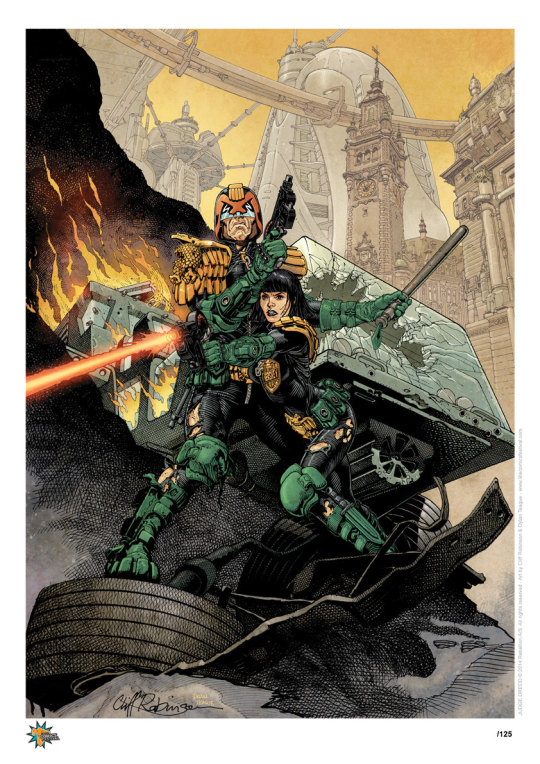
Seemingly satisfied with having thoroughly destroyed Mega-City One and making Dredd horribly responsible for and uncharacteristically powerless during all of it, John Wagner let go of the reins of 2000AD’s flagship character after “Day of Chaos”, leaving the strip in the hands of a new crop of writers who’d waste no time in staking their territory. First with an absolute tour de force of storytelling, and later with epics of their own, filled with supporting casts either handpicked or created by themselves, these writers have carved their own place in the strip by exploring the themes and characters most interesting to each other.
Speaking of characters, the most important development of this era as far as this series is concerned is the return of Judge Hershey to the Chief Judge’s seat. Ostensibly brought back to form an interim administration while the city gets back on its feet, Hershey would end up staying far longer than anticipated, mostly on account of there being nobody else willing and able to take on the monumental responsibility. Least of all, Dredd himself. More on that… right away, actually.
(Previous posts: 1979 to 1982 - 1982 to 1986 - 1986 to 1990 - 1990 to 1993 - 1993 to 1995 - 1995 to 1998 - 1998 to 2001 - 2001 to 2004 - 2004 to 2007 - 2007 to 2009 - 2009 to 2012. Cover art by Cliff Robinson)
We hit the ground running with “Bullet to King Four”, by Al Ewing and Henry Flint (prog 1803, October 2012) a prologue to the year’s first epic. Back in the driver’s seat of a city dangling from a cliff, Chief Judge Hershey is already hard at work. During an interim council meeting that includes Dredd, Judge Stalker and new Wally Squad acting chief Judge Folger (Judge Hollister is mentioned as being MIA, her cover blown during Chaos Day), she reveals her plan to merge Justice Dept’s various units into larger divisions as a way to consolidate their beleaguered forces. She also introduces, to Dredd’s immediate disgust, a new head of Undercover Division and obvious source of future trouble: Judge Carolyn Bachmann.
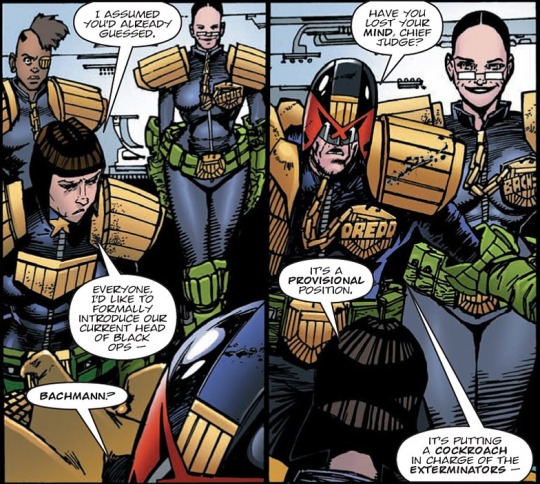
Bachmann had been introduced in a Megazine story set during Tour of Duty called “The Family Man” by Ewing and Leigh Gallagher (Megs 312-313, July 2011), where she was hinted to be the secret head of Justice Dept’s Black Ops Division, introduced years ago in Si Spurrier’s “Dominoes.” An incredibly shrewd, cunning and manipulative woman, Bachmann clashed with Dredd over unsanctioned killings in the mutant townships, but he was ultimately unable to gather enough evidence to go after her in any official way. In fact, during “Bullet…”, Hershey directly references having heard Dredd’s accusations, but stands by her decision to keep Bachmann around. And then we get three of the most savage panels in the history of the strip:
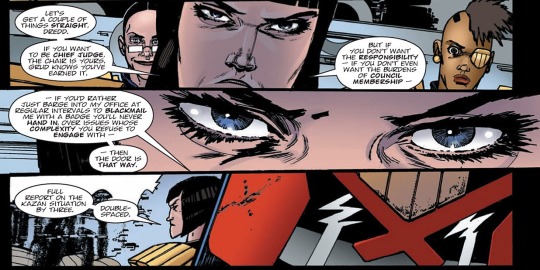
Oof.
Clearly, the good old days of the Dredd/Hershey team are over. Or at least on life support. There’s definitely a lot to be said about Hershey’s words here, starting from the fact that she’s unequivocally, absolutely, 100% right. Dredd has proven, again and again, that he has extremely little patience or desire to deal with the logistical consequences of his decisions. The clearest example of this is back during “Mutants in Mega-City One”, when Dredd arm-twisted his way through the entire Council of Five, but then grew tired with all the politicking he himself started and left them to deliberate it on their own. It was Hershey’s cunning and willingness to stay the course that saved the repeal then.
And then there’s the resignation thing. This is something that Hershey’s not only had to deal with twice (first in “Total War”, then in “Mutants...”), but she was also there when Dredd did resign and eventually came back, during McGruder’s second term. She knows, arguably better than anyone alive, that Dredd is a judge and could never be anything else. What’s interesting is that this time, she doesn’t hesitate to call his bluff. While before, Hershey would’ve been more open to cooperation and second opinions, now she’s stuck doing triage for a half-dead city. And the last thing she needs is Dredd’s constant small picture problems meddling with her attempts at saving what’s left of the big picture, a responsibility that Dredd is staunchly reluctant to take as long as there’s someone else available to do it.
But although Hershey is right in her assessment of Dredd’s mindset, Dredd is likewise right in his assessment of Bachmann’s intentions. In fact, it’s even suggested at the story’s end that Hershey and Bachmann might be working together, which, given Hershey’s penchant for secret operations during her first reign, isn’t entirely unfounded from an in-universe perspective. Par for the strip’s course, nobody is entirely right. But despite the particulars of the story, the key element of “Bullet…” is how it has come to define Dredd and Hershey’s relationship for the last six-odd years.
Following such a strong start, we have “Asleep”, by Rob Williams and Mark Harrison (progs 1804-1805, idem), about a sov sleeper agent being reactivated by accident and gunning for the Chief Judge. The end result is an unabashed Hershey-in-peril scene, complete with her staring down the barrel of a gun on her knees and Dredd saving her life with some quick talking. So bit of a disappointment after the previous story, but hopefully it won’t become a trend or anything. Also of note: yet another redesigned female med-judge.
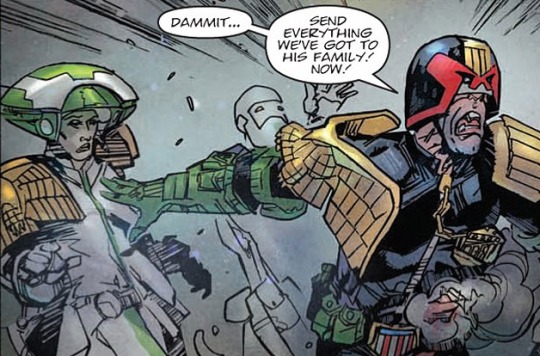
Then we get to the first epic of this new post-Wagner era, “Trifecta”. Which, in my opinion, is one of the strongest and smartest uses of 2000AD’s anthology format in storytelling since “The Dead Man”. Even in collected form it’s still not quite as interesting as it was reading it in the progs, and that’s because it is formed by three different series by three different creative teams that all started independently, and were only revealed to be different parts of a same story one third into it. Now, because I’m a stickler for the self-imposed rules of this series of articles (and certainly not because I’m a lazy bastard), I’ll focus only on the Dredd portion of it: “The Cold Deck”, by the returning team of Ewing and Flint (progs 1806-1811, October-November ‘12).
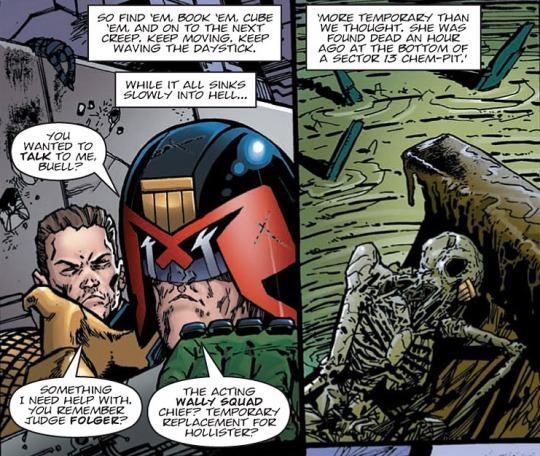
The story starts with the news that Judge Folger has been found dead in rather grisly circumstances, and to make matters worse, she’d also taken an important file from Wally Squad’s computers and erased all copies before dying -- a file so top secret, nobody knows what it is. Dredd suspects Bachmann, and Buell, former head of the SJS, agrees, further suggesting that she’ll use the scandal to prompt a reorganization, strengthen her position and eventually become Chief Judge herself. Which of course, doesn’t sit well with Dredd at all.
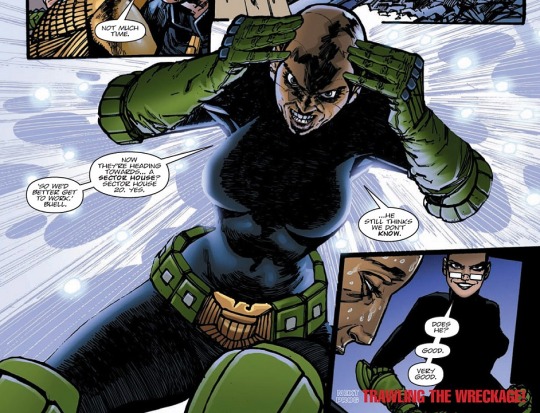
We’re also introduced to Judge Estrella, Bachmann’s partner in crime. A psi-judge, she spends most of the story mentally spying on Dredd on her boss’ behalf. Bachmann is not one to leave anything to chance.
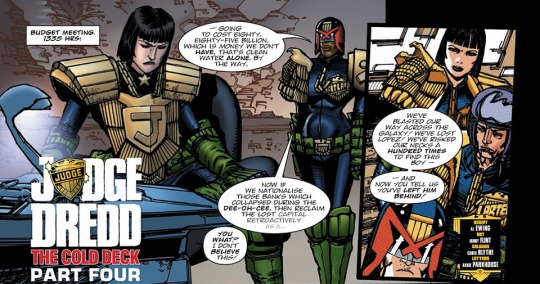
Dredd tracks the file down but intentionally fails to stop it from being sold to someone off-world, where it’s revealed to be a list of every Wally Squad judge in operation. For this, Hershey summons Dredd to her office in an episode that picks right up where “Bullet...” left off, in more ways than one. Opening with Hershey having a flashback to the final pages of “The Judge Child Quest” during a budget meeting with Judge Maitland (who’s also hinted at being part of the epic’s underlying plot), she’s left alone with Dredd. The chapter, set almost entirely from Hershey’s perspective, is an exceptionally sharp bit of writing that segues flawlessly from plot to character development and then right back to plot with notable ease, comfortably aided by Flint peppering the pages with tight close-ups that convey a feeling of claustrophobic closeness between the two judges.
On one hand, we find out that Hershey was fully aware of Bachmann’s underhanded tactics, having made good use of her advice in the past, and wanted her in the Council as a way to get her out in the open and hopefully find something more solid to arrest her for. For the sake of the city, Hershey is willing to give an ambitious spymaster just enough rope to hang herself with, while Dredd would prefer to just hang her himself. But now, both Dredd and Hershey find themselves playing different games but not trusting each other enough to let the other in on them.
And on a deeper level, we get to see the differences between Hershey and Dredd’s conceptions of what it means to be Chief Judge, which is where the flashback comes in. After all, it was Dredd who refused to bring Krysler back to Mega-City One, espousing the notion that the Chief Judge had to be incorruptible. Hershey notes that Dredd idolizes the position of Chief, often leading him to stand in harsh judgment of the men and women who have taken it in the past. Indulging in a bit of armchair psychology, I feel like a lot of it has to do with Dredd’s relationship with the closest he had to a biological father: Judge Fargo, the first and best Chief Judge, against which all others have to be compared. And even if Fargo proved to be more human than it seemed, his myth and Dredd’s indoctrination have created an impossible set of standards in the latter’s mind that nobody else is able to live up to.

But Dredd has never been Chief Judge. Hershey has. Twice. If Dredd knows what the position should be, Hershey knows what it is. And she has no qualms in admitting that it comes with a hefty amount of compromise, subterfuge and even corruption. She laments the loss of her ideals, some of which we’ve been first-hand witnesses to over the years, but still proves to have the good of the city as her ultimate goal at all times. In fact, her attempt at ousting Bachmann is likened to her “victory” over Judge Edgar during her first reign. But in an even more personal level that has very little to do with the current situation, Hershey is shown to be wounded by Dredd’s lack of trust in her, when she trusted him enough to be kicked out of office for him. Dredd’s narrow focus on his vision of what the Chief Judge and the city should be makes him willfully blind to the compromises needed to fulfill it and to the sacrifices others make for believing in him. And Hershey, who has already given everything save her life for him once, is officially through taking his stomm.

And on a personal (for me) note, having such an exceedingly layered, compelling relationship between two estranged former friends without any romantic tension at all is one of the reasons I absolutely love Judge Dredd.
Things escalate pretty quickly after that. Bachmann is forced to execute her plan sooner than expected due to the Wally Squad list being a fake used to lure her out and ruin her scheme to create a shiny new Mega-City reserved for indoctrinated citizens with the assistance of an insane shark-headed (that’s not an euphemism, he literally has a shark’s head) business mogul. Her black ops troops start taking over the Hall of Justice, and she herself beats up and guns Dredd down, but he’s promptly saved by Maitland, who also kills Estrella in the process. This all sets up the stage for the last episode of the epic, the titular “Trifecta”, by Al Ewing, Simon Spurrier, Rob Williams and drawn (gorgeously) by Carl Critchlow (prog 1812, December 2012).
With all the conspiracy and most of the character bits out of the way, the conclusion is a very two-fisted action affair that includes an honest-to-grud flashback cameo by Chief McGruder of all people, a hilariously uncomfortable one-panel reunion between Dredd and Galen DeMarco (who’d been featured in Spurrier’s portion of the story), and one of the all-time greatest Hershey panels:

So with Dredd finally fessing up to knowing about Bachmann’s plans and Hershey admitting that she underestimated their scope, all that’s left is dealing with the mastermind herself. Like any good final boss, Bachmann proceeds to beat the crap out of everyone, including lobbing a stun grenade at Hershey to get her down on all fours which is awkwardly similar to the end of “Sleeper” up there. But in the end, she gets killed from behind by Judge Smiley, a more-secret-than-secret black ops judge who’d been brought in as a countermeasure by Judge Griffin after Cal’s reign, to prevent something like that from ever happening again. Hershey is understandably upset to learn there’s been a presumed-dead spy living in the walls of the Chief Judge’s office for the last 20 years, and berates him for not coming out for any other previous crisis and Dredd for not trusting her. So although the day is saved, it wasn’t without damage, both inside and out.

To Dredd’s credit, however, he’s not a bastard to everyone in this story.
What’s especially notable about “The Cold Deck” is the sheer breadth of roles in display for its female characters. The antagonist, the main side protagonist, the sidekick, the antagonist’s sidekick, even the catalyst for the story itself are all female, plus a handful of background judges in the final chapter. In many ways, this story is the end result of all the past years of development for female judges in the strip. Women encompass all possible roles, from minor to major, from incidental to fully developed, and on both sides of the conflict. By comparison, the other two parts of the story have either no female characters (”Saudade”) or only DeMarco in a very secondary role (”Jokers to the Right”). Meanwhile, the many female characters in "The Cold Deck” are all established characters with different degrees of development, none of which were created for this story except for Estrella. And while it can be argued that it’s astonishingly easy to introduce new characters in Dredd, the fact that a major storyline can encompass such a wide variety of female characters in an organic way still speaks volumes of the people behind it.

After such a whopper story we get a chance to catch our breaths with a Judge Hughes doing sidekick duties in prog 1818’s “Witch’s Promise”, by Alan Grant and David Roach (February 2013) and then it’s right back into the fray with 1820-1822’s “Wolves”, by Michael Caroll and Andrew Currie (idem). The story concerns Dredd and Hershey’s efforts to stop a wave of violence against sov-born citizens after Chaos Day. When things come to a head, Hershey orders all citizens with roots in East-Meg to be taken to a massive internment camp, and then repatriated by the sov block in exchange for much needed food rations, a plan that Dredd is adamantly against. When the citizens refuse to be moved, Dredd proposes relocating them to Mega-City Two instead.
So we can see how Ewing’s character development threads have been picked up by Carroll: Dredd’s increasingly humanistic streak clashes with Hershey’s cold, pragmatic worldview, and in the end it’s Dredd who suggests the solution. At times it reads like a modernized version of much, much older stories where Dredd suggests a straightforward solution to a complicated situation (“Bob’s Law”, anyone?) but I’d argue that the wider context upon which it happens and the decision to let these problems become longer plotlines instead of isolated incidents all conspire to create some annoying quibbles, at least for me. But more on that later.

The story continues in “Cypher”, by Carroll and Iñaki Miranda (1824-1825, March ‘13), where Hershey and Dredd have a meeting with a soviet envoy and his bodyguard, Judge Caterina Pax, to discuss their reneging on the deal. The meeting is almost immediately broken up by a sniper who wounds Hershey and is driven off by Dredd and Pax. With the sov judge’s assistance, Dredd manages to kill the sniper, who turns out to be a cyborg hired by the envoy to kill Hershey for not quite clear reasons, and Pax expresses her desire to defect to MC-1, netting us our first new recurring female judge of this period.
Speaking of new recurring female judges, Psi-Judge Hamida returns in “Suicide Watch”, written by Gordon Rennie and Emma Beeby, and drawn by Paul Davidson (1826-1829, April ‘13). The first Dredd story written by a woman, it features Hamida having a bit of an Anderson/Corey moment, hallucinating a chat with her dead imam over halal hot dogs and feeling the weight of all the dead citizens killed by the Chaos Bug. She links up with Dredd after having a psi-flash, and together they go on the hunt for a potential suicide cult. But things get complicated when Hamida reveals that there’s a jinn -- a supernatural entity who erases people from existence and history behind it, and then even more complicated when Dredd finds out Hamida has been a suicide risk herself since Chaos Day. Ultimately, Hamida perseveres and beats the jinn, saving both Dredd and the day in a rare case of Dredd playing sidekick.

Carroll returns with PJ Holden in tow for “The Forsaken” (1830-1835, June ‘13) which features no less than five female cadet judges, each one with full names and in one case a big secret. Lori Cassano, Madison Echavez, Cheryl Tanuma, Angela Sorvino and Jessica Paris are all part of a group of cadets left for dead after Chaos Day who, feeling abandoned by Justice Dept., made a run for it. The story is told mostly in flashback as Dolman and Dredd track each surviving member, some of which are terribly wounded, and eventually manage to find Paris, who is then revealed to be a clone from Fargo’s DNA strain, effectively making her a female Dredd. Dolman brings her back to the city, with the added complication that she’s carrying the child of one of the other survivors of the incident.
The main hook of “The Forsaken” is getting to see a group of would-be judges giving in to absolute despair, their training falling apart under the strain of an extreme situation and how they form bonds and relationships between each other. While we’ve seen female judges “give in” to their humanity more than once, it rarely comes accompanied by dereliction of duty, and this one has it en masse. Unfortunately, far as I know neither Paris nor her child have appeared again so far, so we’ve yet to see what a fully-fledged female Dredd can look like.
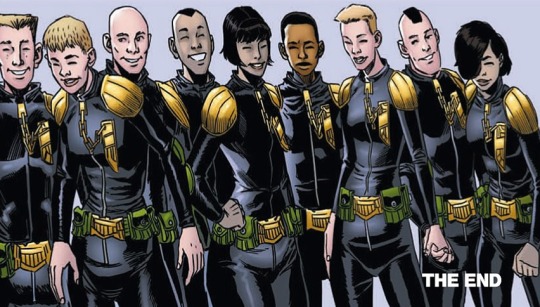
Up next, a Judge Lawadski meets a gory end in Rob Williams and Trevor Hairsine’s “Skulls” (1836, idem) and we check in on Judge Beeny in John Wagner and Dave Taylor’s “Wastelands” (1837-1841, July ‘13). She only makes two short cameos in here, but we find out that she’s been taking a page from Dredd’s book and keeping busy to stop herself from brooding. Interestingly enough, Dredd suggests that she take a break, noting that she’s “going to have to deal with it sometime” and that, if she really wants to change things, she’s going to have to do it “from the inside.”
That last comment in particular is interesting, as it sets up a plotline that Wagner will eventually bring to the Megazine while also staying true to Dredd’s characterization. Dredd, like Beeny, wants Justice Dept to change, but he remains reticent to go in and do it himself. And now that Hershey’s been compromised, he’s putting all his chips on Beeny, making sure that she doesn’t burn herself or become too attached to the streets. Dredd even sugars her up a little, off-handedly noting that she’s one of their best judges. Of course, Wagner being Wagner, this is all conveyed in about eight panels and less than twelve lines of dialogue, all book-ending a completely unrelated plot. In other words, a grand study in character development economy.
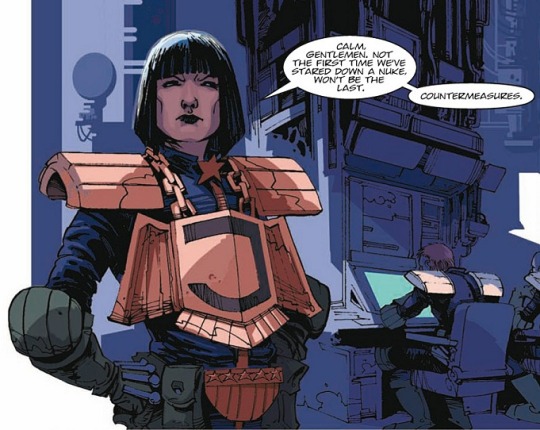
Carl Critchlow comes back to art duties in the Rob Williams-written “Scavengers” (1842-1843, August ’13), which sees Dredd travel underwater to the submerged ruins of Bachmann’s new Mega-City. The story features a Judge Chen who sacrifices herself in a fight against a giant mutated squid in order to keep the mission a secret and also a rather handsome Chief Judge Hershey appearance. We have a Judge Bova in Wagner and Ben Willsher’s “Bender” (1845-1849, September ’13) and Judge Pax returns as one of the stars of Michael Carroll and Paul Davidson’s “New Tricks” (1850-1854, October ’13). After an in-depth screening, she has been allowed to join judges from several other Mega-Cities (including the son of Irish judge Joyce, from “Emerald Isle”) as part of a transfer program to pad out the city’s drained forces.

Pax is shown to be exceedingly competent from the get-go, and the story is even narrated entirely from her journals, through which we learn, among other things, that Dredd seems to have taken a slight shine to her. The main plot involves a Judge Gwendolyn Kilgore, who’s returned from taking the Long Walk into the Undercity to ask for help in taking down a mythical Troggie gang boss called the Goblin King. Fairly standard action strip fare, mostly used to showcase Pax’s skills and to introduce Joyce. But it is certainly interesting to read the former’s thoughts on Dredd and MC-1 in general.
Hershey comes back for another round of workplace awkwardness in “Prey”, by TC Eglington and Karl Richardson (1855-1857, November ’13), although she seems to have grown accustomed enough to crack jokes about it. And that leaves us right at the doorstep of the first of a three-part epic by Rob Williams and Henry Flint: “Titan”.

This first part, which ran from progs 1862 to 1869 (January-February, 2014), kicks off with the news that all contact has been lost with the judges’ penal colony in the eponymous moon of Titan. Without an army to bring any possible rebellions to heel and unwilling to destroy the whole colony before getting all the facts, Hershey sends Dredd and a team of space marines to Titan to recon the place and see what’s going on in there. But after a seriously messed up landing and a couple of betrayals, Dredd finds himself alone and at the mercy of the masterminds behind the convicts’ uprising: former Chief Judge Sinfield, and former Wally Squad Judge Aimee Nixon.
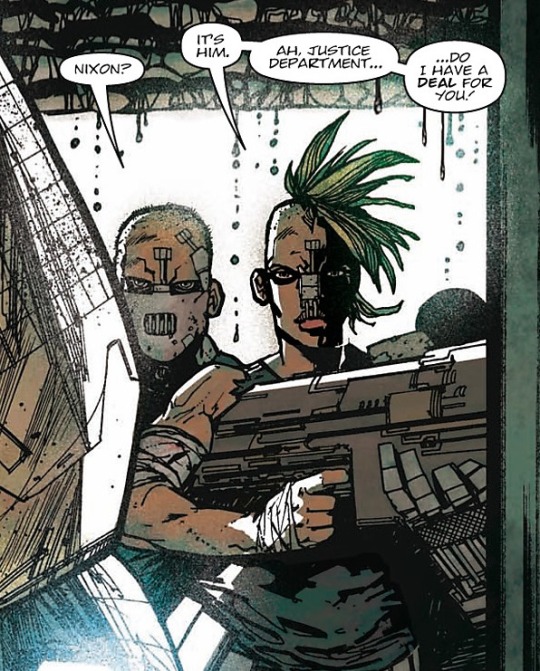
Nixon, of course, was one of the main characters of Williams’ own Low Life serial. An undercover judge on the edge, she eventually quit the department and joined the Hondo City Yakuza in a bid to save her sector from a gang war, but was brought back by her partner, Dirty Frank, and put in an iso-cube for a debriefing, her intel supposedly keeping her safe from Titan. But after Chaos Day, her and several others were shipped there anyway, breaking their deal and leaving her even more embittered and vengeful. Her appearance here is quite the surprise, but makes sense considering the creative team. As Williams’ time became more focused on the main Dredd strip, more characters from Low Life would begin appearing there in guest spots. We’d already seen a hint of that in the last epic.
Back in the plot, once she realizes who she’s got in her hands, Nixon begins negotiating with Hershey. Unlike the last revolt (“Inferno”, all the way back in part four of our retrospective) the inmates here only want to be given Titan as an independent colony. But meanwhile, Nixon has also begun torturing Dredd, trying to break him down to make the man underneath the stoneyface come to the light in hope that his desire for revenge will overcome his loyalty to the law. It’s all a bit “The Killing Joke”, as Nixon seems intent on proving that every judge, even the toughest of them all, hides a human being inside, full of human desires and emotions -- just like she had.
But ultimately, Dredd proves to be too tough a nut to crack, and even when the only survivor of the marines sabotages the colony and Aimee and co are forced to evacuate towards Enceladus, Dredd still refuses to destroy their escape ships, ruining Aimee’s plan to destroy him by making him break the law. The former judges escape, Dredd survives to fight another day, and everything works out alright… for now. Overall, “Titan” is a fairly intense start that goes to some surprising places, but it also does rely a bit too much on a foregone conclusion, which is Dredd not choosing revenge. It’s also pretty funny that this makes it two epics in a row that include a scene of a female judge antagonist arguing with Hershey over a monitor. Wonder if that will be the real trend?
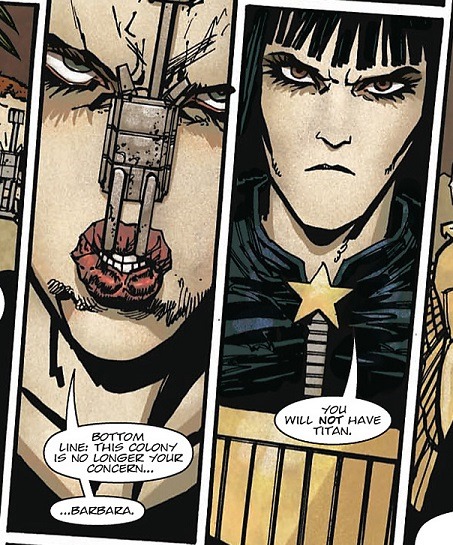
Also of note: Flint seems to have some trouble keeping Hershey’s eye color consistent, since they were blue back in “The Cold Deck.” Or maybe she just has a box of contacts.
We take a breather with a Judge Sisulu side-kicking it up in “Squirm!” (Carroll and Nick Dyer, 1870-1872, February ’14) and then we’re back with Williams and Flint for prog 1873’s “Fit” (March ’14). An epilogue to “Titan”, the story has Hershey send Gerhart, an SJS judge with an axe to grind who was with Dredd during the ill-fated mission, to check on Dredd for any lasting side effects of his experience on the colony. The most interesting part of this one-off for our subject is the very last page, where Gerhart notes that, owing to her history with Dredd, Hershey is ultimately ready to follow him anywhere despite this ongoing cold war between them, which zeroes in on a particular wrinkle in their relationship. For all their mutual posturing and disagreements, ultimately both Dredd and Hershey are fueled by a strong sense of duty towards the city. But while Hershey is worried by its continued day-to-day survival, Dredd is increasingly driven by his vision of a fairer, more human society. In an overly simplified nutshell, Hershey cares about the city, but Dredd cares more about the citizens. And despite her barely being present in it, the next story is one of the strongest examples of this seemingly irreparable schism.
Running in progs 1874-1878 (April ‘14), “Mega-City Confidential” marks the return of John Wagner to the strip, accompanied by Colin MacNeil. A delightfully bleak conspiracy procedural, it ends with the reveal that Justice Department has been taking advantage of the post-Chaos Day rebuilding projects to install covert surveillance equipment in millions of homes, accumulating information that is then parsed by human operators to seek out any signs of criminal activity that may necessitate a not-so-random house search. But when one of those operators escapes and turns whistleblower, Dredd is forced to defend the secrecy of a project he himself had grave misgivings about, calling it “a rare mistake” from Hershey. And once the secret is out, public outcry forces Justice Dept to roll the project back, but not before jailing the operator and probably having the journalist responsible for the leak murdered. Light reading, this ain’t.

That sounds familiar. Also, while not named, this might be Judge Stalker.
On its own, the story works as evidence of Dredd’s growing disgust with the dehumanization inherent to the judicial system, and his own discomfort as a cog within a machinery that seems increasingly prone to falling into these excesses. As such, Hershey’s error of judgment is mostly an afterthought, but I do find it’s interesting to put it within context. The Chaos Bug attack, for example, relied heavily on privacy and subterfuge, so it’s easy to see why Hershey, who’s trying to keep a dying city alive, would be tempted to go forward with something -- anything that could prevent something like that from happening again. It’s a steep change from when Hershey was considered the most liberal of all the candidates for Chief Judge, but makes sense given her own personal development and the circumstances of her return to the position. As she’s grown older and her situation direr, she seems much more open to sacrificing the liberties she used to champion for the sake of keeping people alive. So in a way, her character development has taken on a polar opposite route to Dredd’s.
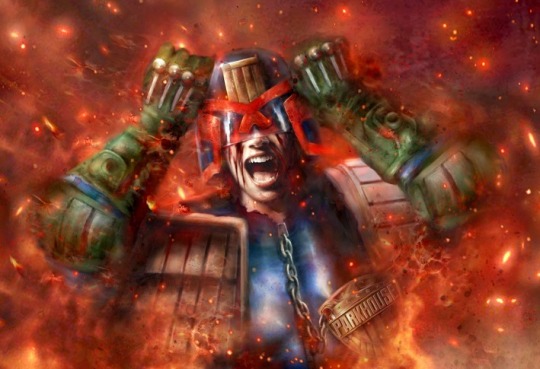
Wagner stays a little longer for “Shooters Night” (art by John McRea, 1879-1882, May ‘14), which nets us an unnamed female judge and a small Hershey cameo at the end. Then Carroll returns with Nick Percival for “Traumatown” (1883-1887, June ‘14), a story about Dredd being haunted by a near-dead Psi’s vengeful spirit that features a veritable cavalcade of female judges: Pax and Hershey guest star alongside new Psi-Judge Lewis, and there’s even a funny little cameo by a Judge Parkhouse, clearly named after long-time 2000AD letterer and unsung heroine Annie Parkhouse. After that blowout, we get a small med-judge appearance in 1890-1891’s “Student Bodies” (Wagner and Boo Cook, July ‘14) and a new crisis for Dredd and Hershey in “Cascade” (Carroll and Paul Marshall, 1894-1899, August-September ‘14) as the Lawlords, a race of brutal alien overseers whom Dredd had already faced in a previous story, attempt to take over the city. The story features a Judge Reyer who dies trying to stop the attack early on, and unfortunately, Hershey’s role in it is mostly just glowering a lot while Dredd saves the day as usual.

Up next we have the return of Judge Beeny in Wagner and Carlos Ezquerra’s “Block Judge” (1900-1909, September-November ’14), where she assists Dredd in bringing a troublesome block to heel. But although it’s great to check on her progress as a judge, there isn’t much character development to be found here, and it’d seem Beeny is on the track to becoming another Dredd sidekick template. Wagner, however, has bigger plans for her, although as mentioned before, the big turn will happen in the Megazine.
The story also has a couple of guest appearances from Hershey, as Dredd for once acts very tactfully around her, asking for her help in keeping a couple of crime lords locked up for incredibly petty crimes until they can uncover more evidence. As usual, a common enemy does seem to unite them well enough, although Hershey can’t resist calling Dredd out a little on his criticisms. But for a moment, the old team is back together, with Hershey making sure Dredd is able to do his job as effectively as possible.
Another nameless female judge shows up in Alec Worley and Leigh Gallagher’s “End of the Road” (1911, December ’14) and the year closes with a return appearance by Judge Lewis in Carroll and Karl Richardson’s “The Ghost of Christmas Present” (prog 2015, idem). And if things sound like they’re finally settling down a little, don’t worry, because our last stop of this post features the biggest return of them all...

“Dark Justice” (progs 2015-1921, January-March 2015) was famously born out of artist Greg Staples’ desire to paint a classic Dark Judges story. And although John Wagner had admitted to basically having run out of ideas for them, he was happy to go back in after seeing Staples’ test sketches. The end result is a visually stunning mini-epic with an otherwise fairly standard plot, as Dredd and Psi-Judge Anderson team-up to hunt down Judge Death and his pals onboard a deep space colony ship. Not much to say character-wise about this one, as both Dredd and Anderson seem to revert back to their early 80s action hero selves, filling the story with wisecracks and one-liners as they batter the fearsome foursome. Anderson does get to shine pretty brightly on this one, pulling Judge Fire’s spirit out of Dredd’s mind and revealing that her past experiences with Judge Death have allowed her to develop a slight immunity to his powers. In the end, the superfiends are ejected and left drifting in space while our heroes await a rescue, and there’s not really much else to say.
One thing that is noteworthy is that Staples used model and cosplayer Lauren Integra Fairbrook as his model for Anderson in “Dark Justice”. Which makes sense, considering she’s the official Anderson model for Planet Replicas and has featured in the Judge Minty and Strontium Dog: Search/Destroy fan shorts. In fact, there’s even a reference to an “Lauren Integra Cosplay Ground” in “Mask of Anarchy”, a previous Dredd story.
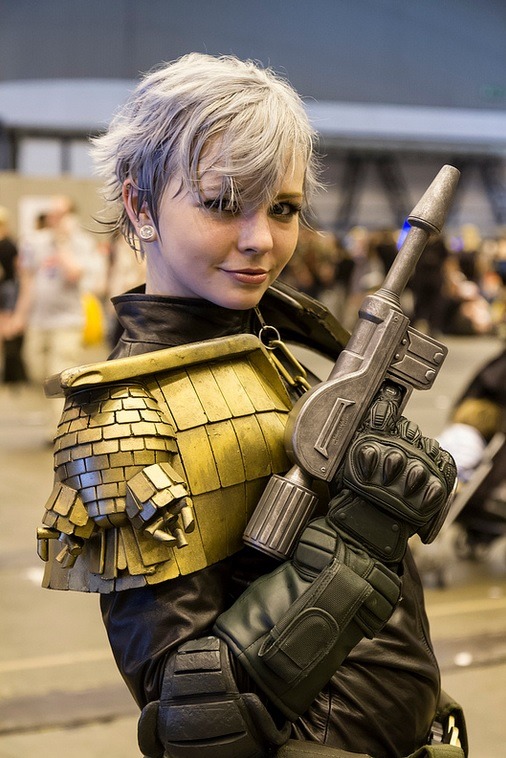
And as an extra bit of trivia, Planet Replicas’ official Dredd model is… Greg Staples himself.
In our next episode: two epics! Two thousand progs! And... The End?
#2000AD#Judge Dredd#Female Judges#Al Ewing#Henry Flint#Rob Williams#Mark Harrison#Carl Critchlow#Michael Carroll#Andrew Currie#Iñaki Miranda#Paul Davidson#PJ Holden#John Wagner#Colin MacNeil#Nick Percival#Paul Marshall#Greg Staples#Lauren Integra Fairbrook#Judge Hershey#Judge Bachmann#Judge Hamida#Judge Maitland#Judge Pax#Aimee Nixon#Judge Anderson
34 notes
·
View notes
Text
Might be last 'typing for a while... I f--king hate myself for not taking that job; the principal was sincere; they called my former employer. The landscape was beautiful like 'The Place Promised in Our Early Days' with the dark pines. Paju is a center of the publishing industry although books / fiction and the whole 'condition of fiction' by which people think their own children, neighbors, selves etc. are anime characters is pozzed from here to Eternity along with personality-politics.
There is a poem or 'hymn' or 'psalm' or 'cry of the heart' I wish I could write spurred partially by Servants of Christ's video with the river in Korea and 'I Need Thee Ev'ry Hour. I don't know why I took myself for a failure for so long or put down roots in this poisoned Babylon when in retrospect people were sending me little 'Evangelical Satanism' messages in the form of brand-slogans et cetera for like 5 years instead of reasoning honestly. That's why I sincerely say nuke Milwaukee - that's not pedagogy, neighborliness, love, family, friendship. It's nothing but a swap-meet.
I got sad today looking at a picture of a celebrity from a famous rigged girl-group that I always defended the rigging of due to aesthetic opinions about 'composition' and realizing something that my college girlfriend's roommate realized about her back in the day but then I felt, 'The condition of prostitution in some respects is preferable to the condition of Germanic / Teutonic purism, which leads to pedophilia and homosexuality on the one hand and mass-murder on the other.' Moreover you can just look at a f-cking hostess-bar and talk and it prepares one for love IMO better than Western movies although I don't know anymore.
I wanted to cancel all my projects like 'Stepfather' (about a teacher getting sick of his colleagues for innuendos, careerism, negativity in the lounge, everything that ppl KNOW is bad but no one ever fixes)... just 'cause I don't know if I can even live and moreover I started to intuit the different endings idle vain people would want to see.
I keep saying again and again a key component of the 'Covid culture wars' is 'anti-belief' as well as people's wanting to duel one another to the death over past grievances micro or macro. At day's end and at bottom 'anti-belief' - or attempting to convince people that truth is a lie; ex. that Koreans are unreal - compels people to pare themselves down to their ultimate solipsism or, I realize, inability to distinguish Flesh from Spirit in any fruitful and abiding way.
I was reflecting on how talking about 'The Meaning of Marriage' led someone to cohabitate which totally failed for me as well as wondering whether my gifting this book was interpreted as a 'magic sign' rather than simple no-hidden-message offering. One thing I loved about Koreans at least at my first job was there were no hidden messages at least from the senior administration.
I drove to Bethlehem College and Seminary and felt a power radiating from the church but am in no position to assist them or join their Global Studies program which I'd wanted to intellectually. I haven't really done anything with my life but study EAS, K-Studies, languages, etc. I had visions and dreams of stealth-bombers honestly, Russian drills planting nuclear devices deep in the Earth to destabilize the orbital axis - Putin could kill any or all of us at any time, I am convinced. I wondered if the Russians or 'Varangians' were the 'last people.' They decide.
In Milwaukee, in Germany people joke about things like Hitler's dog, racism, homosexuals and amuse themselves waiting for people to get hoist by their own petard.I also remembered how for years I thought about Cordelia in 'King Lear' but despite reading this play like 30 times I still don't understand completely how a 'Christology of Cordelia' could be articulated to make people understand their blindness to Charity.Also related to Mary HK Choi's 'Yolk,' a novel which disappointed me but which I felt could be one of those 'ultima novels; last words.'
I keep remembering despite whoever wants to make me forget that Covid is or was an opportunity to pursue better international relations / build connections and relations not dependent on blind policies like IMO American NK policy or other official diplomacy. I had big dreams about avoiding war as well as people holding goods more in common by my attempts to donate a few laptops and some money stripped me of my net worth and were not proportionately matched. Everyone seems so determined to live their own story and cling to things when they could be dead in 24hrs from Delta variant Covid 19 and everyone knows it. Tornadoes, hailstorms. Man spent the last hundred years of more building trillions of dollars of weapons of war while schooling problems are the same as they were back in 1881 - as are the problems faced by graduates particularly orphans and minorities and, also, any intellectual in a society which still despises these three categories.
Maybe I just gave people dreams in the past and maybe I was too free in the past or stopped wearing the right clothes too soon. I gave up on the future long ago - I reflected recently as I had always felt but not articulated - that as Koreans say the favored child is favored outside the home so too the hated child is hated - but I kept getting chances even without understanding others' points of view to be a part of their past. But I don't even know if Education is the point or Build Back Better or anything like that when 4 million people died and the '3rd world' variants from India as well as South America are basically destined to come to the 1st world. I tried to convince people that there could be a beautiful future in which everyone lived more lovingly, courageously et cetera and rediscovered God.
I also felt, however, from a long time ago that when it comes to US Korea policy and perhaps to the salvation or deliverance of America's domestic population from a worse Covid variant the most caring organization literally is the military and not any philanthropy; I don't know if anyone else could step in, though by that same token, I was thinking about IXK / anti-racism which I embrace as an alternative to Obamaism, and couldn't help feeling like the 'Grand Alliance' of this day has something to do with abortion-culture (which [Chancellor] John Piper summarizes as men playing God the Father and the strong preying on the weak; and for which I formulated the term 'unconditional evil' or the attitude that powerful men possess a lifelong veto over the lives and wellbeing of anyone else), though coefficient with race-relations or rather 'recognition' of other people as beautiful, beloved, perhaps chosen. I was telling someone 'Language is a phenomenological...' My favorite songs other than 'I Need Thee,' 'This Is My Father's House,' some older stuff, have been 'Make Me Love You' by Kim Taeyeon which is a song about the 'shared gaze' and 'Clover' by Fromis which embodied my desire to help kids 'get life right the first time' through teachers and structures that would 'save people from themselves.' But then my mind traveled to Japan, swords, halberds, maidens, all kinds of new birth-defects and problems in the new age, and I couldn't help feeling that some things will be very much the same and in a way it is my fault for losing my fire. I'm dreaming in dark red and am incredibly frustrated reading Eric Feigl-Ding on Twitter that the West - Canada, America, UK - is perpetrating this corporatist mass-sacrifice..
I want to just fly away to KR where at least they count the bodies honestly but wish Americans would go home, get married, go to Church more often. Everyone seems so unwilling to put their stories on hold or discard their fetishes / idols (Healthcare, Money / Mammon, Science, The Past, Ultimate Communist Utopian Social Justice, Almighty Meritocracy...). Some ambrosial(?) explosion, the Face of Jesus, with or without me may the 'Grand Alliance' prevail.
0 notes
Text
Invincible Review (Spoiler-Free)
https://ift.tt/eA8V8J
Ultra-violent superhero stories are anything but uncommon these days. But back in 2003, when Robert Kirkman’s Invincible debuted on comic shelves, it was unique in its juxtaposition of startlingly vivid violence and gore with colorful, Saturday morning cartoon imagery. And the violence wasn’t for show—unlike most popular superhero stories, characters in Invincible die all the time, and for the most part, they stay dead. The blood and guts splattered across the panels were a constant reminder that this superhero story had real stakes.
Eighteen years later, Invincible is now an animated Amazon Original, with Kirkman attached as writer and executive producer. This adaptation captures both the aesthetic and tone of the comics well, with animation that effectively mimics the book’s original art by Cory Walker and Ryan Ottley, and a level of violence that has earned the show a TV-MA rating.
Like the books, the show centers on Mark Grayson (Steven Yeun), an ordinary high schooler with an extraordinary family tree. His father is Nolan Grayson a.k.a. Omni Man (J.K. Simmons), a super-strong, super-fast, extraterrestrial superhero from the planet Viltrum. Mark’s mom, Debbie (Sandra Oh), is human, which means Mark is only half Viltrumite and has been waiting since he was a child for his powers to manifest. When they finally do, he’s thrust into a new world of superheroics that he isn’t quite ready for, all while attempting to navigate the brambles of teenage life.
As Mark learns to control and harness his new abilities, his relationship with his dad begins to take on a new complexion. Like a lot of dads, Nolan employs a tough-love approach to raising Mark that sees him push his son to his physical limits to prepare him for the hardships of being a superpowered protector of Earth.
There are clear parallels to be drawn to other superhero myths here, with Superman being the most obvious comparison. The show even features the Guardians of the Globe, a Justice League proxy whose members include “Red Rush,” “Darkwing,” and “War Woman” (resembling The Flash, Batman, and Wonder Woman, respectively). These references are intentionally on-the-nose and feed into the brilliance of Invincible, which is that it subverts everything we’ve come to expect from superhero stories, and in brutal fashion no less. Without getting into spoilers, you can be sure that any initial resemblance the show’s characters have to popular superhero stories is promptly shattered to pieces. Expect big plot twists early on, and even bigger twists just a little further down the road.
There are several moments throughout the story that play with the superhero myth, but at its core the show is about Mark and his relationships with those around him. It’s as much a domestic family drama as it is a sprawling intergalactic adventure, and the characters are written and drawn simply but distinctively, to the point where even the most minor characters are memorable. And if the show is as in-tune with the books as it seems to be from the first few episodes, we can expect to meet an enormous cast as the story unfolds.
One of the most striking differences between the show and the books is just how much the voice acting elevates the story. The cast is stacked, with the surging (and now Oscar-nominated) Yeun leading the charge, supported by a litany of recognizable players like Simmons, Oh, Gillian Jacobs, Jason Mantzoukas, Zazie Beetz, Walton Goggins, Mark Hamill, Seth Rogen (who also serves as an executive producer), and more. The performances and casting are solid all around (Simmons and Oh are the TV parents we never knew we needed), and Yeun does a nice job of capturing Mark’s awkwardness without making him come off like a wimp. Zachary Quinto is a surprise standout as Robot, the number-crunching, non-organic leader of young superhero squad the Teen Team, not because the Star Trek actor isn’t capable, but because he sounds like he was born to play this role. Perfect casting.
For the most part, the show follows the book’s narrative closely, albeit with some plot omissions to account for the shorter format (each episode is around 43 mins long). It’s a coming-of-age story that sees Mark deal with a lot of the same things most teenagers go through, and just as Kirkman’s The Walking Dead is a character-driven story framed by the zombie-apocalypse genre, Invincible’s character work is its greatest strength. While the superhero action and world-building are incredibly cool and compelling, it’s the interpersonal drama between Mark and his friends and family that gives the show its depth.
Visually, the show looks nice, with hand-drawn animation that pops with color. What’s surprising is that, despite the comic being nearly twenty years old, all of Kirkman, Ottley, and Walker’s designs hold up incredibly well. Compared to the books the illustrations and coloring aren’t quite as clean or detailed, but this is to be expected when adapting from comic book to TV. Compared to some of its peers in the animated category, the show doesn’t look quite as dazzling or polished. But perhaps in later seasons we’ll see a higher-budget presentation with more CGI implementation.
Delightfully, Invincible is every bit as gory as the source material is, and seeing some of the bloodiest scenes from the books recreated in motion adds significantly to their dramatic impact. It’s difficult to delve into without revealing spoilers, but whenever there’s an explosion of blood and guts on the show, it’s done with purpose and in support of the story.
While it would have been interesting to see Invincible brought to life as a live-action show or movie, the decision to keep it rooted in the book’s hand-drawn art style seems to be the only way to preserve the spirit of the original idea. The dichotomy of the cartoon aesthetic and the extreme violence is fundamental, and it’d be near impossible to convey that in a live-action setting, particularly when the story expands exponentially in its later acts.
cnx.cmd.push(function() { cnx({ playerId: "106e33c0-3911-473c-b599-b1426db57530", }).render("0270c398a82f44f49c23c16122516796"); });
Pacing is going to be one of the keys to the show’s success moving forward. Invincible is a truly gigantic story encompassing a ton of characters and subplots, and with hope the show will be able to achieve that same sense of scope. So far, the series seems on track to do so and stand out as one of the most unique superhero stories on television.
The post Invincible Review (Spoiler-Free) appeared first on Den of Geek.
from Den of Geek https://ift.tt/3lxRBTG
0 notes
Photo

So,
The guy had been bludgeoned to death by his own chauffeur.
His name was Francis Rattenbury, a famous architect responsible for designing Victoria’s Parliament Building and the Empress Hotel, and he’d traveled to the Kootenays to work on an impressive stone courthouse in the dead centre of town. The dude had traveled all over the world and won widespread acclaim, but ended his life in a gasping, bloody pulp because his wife was fucking his teenage driver. Some say his soul still lingers in his creations, thirsty for revenge.
The vines on Rattenbury’s courthouse are a vibrant green for most of the year, but pivot towards a blood-red colour as summer transitions into fall. It stands sentinel while inside the daily drama of justice plays out. Most of Nelson drives by it every single day, ignorant of what goes on behind the pale stone. It was an intimidating and completely alien place to me, and every week I admired how Ed and Greg could march in there and dredge up incredible court stories on everything from child pornographers to drunk drivers and arrested logging protesters. It was a scary amount of privilege, reporting on what most people prefer to keep private, and it was a skill I was determined to learn.
It was 8 a.m., long before I normally started work, but Greg had sent me down to finally capture a shot of Andrew Stevenson being led into court. I’d been following Ed’s coverage closely, keen to learn more about this shotgun-wielding phantom, and the prospect of seeing him in person had me jittery and half-drunk on anticipation. I felt like one of those Beatles girls that was waiting on the tarmac when the Fab Four first touched down.
“Hey, you’re going to have to move up to the sidewalk. We’re going to be transporting prisoners here in a minute,” one of the sheriffs said, his face furrowed like he was holding in a fart.
“Nobody’s allowed past the top of the stairs.”
I explained to him that I was a journalist from the Nelson Star, and I was told this would be the best place to get a photo. I handed him my card, which he frowned at. Then he glanced around, sighed, and told me I’d have to wait until his boss came around. In the meantime he didn’t want me to move from the bottom step.
“This is slated for the cover of our Friday issue,” I told him. “I’ve been trying to get this shot for over a year, but the dude keeps appearing by videolink.”
He blinked slowly. “Sit tight.”
For another ten minutes I watched the wind rustle the vines, and even took some macro shots of insects while I waited. The sky was clouded over and the wind was brisk. I watched a little convoy of vehicles appear in the parking lot a hundred feet away, and then a strict-looking female sheriff came striding up to where I stood. She was about to tell me to vamoose, like her colleague, when she noticed who it was. I’d been hanging out with her the week previous, covering her participation in the Cops 4 Kids fundraiser, and I’d taken a great shot of her along with her children. Her face transformed, and for a moment she shifted from one foot to the next, trying to figure out what to do with me.
“You’re here for Stevenson?” she asked.
“Yup, I was just telling your guy that we’re hoping to get a cover shot for the Friday edition.”
She nodded. “Okay, well Stevenson isn’t my only prisoner today. We’re going to be bringing in four or five people before him. I’m going to need your word that you won’t take pictures of any of them. Only him.”
“Easy. Done. Of course.”
She nodded again, then leaned in conspiratorially. “Now I want you to stand right there in the grass, in that corner, and I don’t want you to move. The sheriffs will be blocking him as he walks up the sidewalk, but as he rounds this corner you’ll have a few moments to take your picture. You’ll have to be quick.”
“I can be quick, for sure.”
She walked over and demonstrated, miming a camera, how she thought I could get the best angle. It occurred to me that in only moments she’d gone from kicking me off the lawn to giving me a step-by-step walkthrough of how to accomplish my task. Journalism karma, I thought, thanking her profusely. She shrugged and rattled her keys, hurrying off to whatever was next.
It took another ten minutes for the sheriffs to unload the prisoners, and one by one they filed past me with mournful expressions. Some of them were in ankle bracelets and prison attire, while one teenage girl sauntered inside wearing skateboard shoes and a jean skirt. The handcuffs were the only hint that there was anything unusual going on with her. I stood with my arms crossed, my gaze down, while they headed inside to their fates.
“Okay, buddy,” one of the sheriffs said, with a nod. “This is him coming next.”
My heartbeat was thudding against my throat as the entourage approached, two sheriffs blocking my view just like the boss had described. I took a couple long shots that didn’t work, then took a long breath through my nostrils and waited for my moment to come. Just like taking pictures of Nel the osprey a year earlier, I knew the final image would rely on near perfect timing. I watched as the sheriffs rounded the corner and exposed Stevenson, whose gaze was downcast as he loped past.
He had acne-scarred cheeks, a bad haircut and cheap-looking thrift store clothing. The dude was approximately my age and shorter than I’d imagined. The word that rung through my head was pathetic. This wasn’t some monstrous villain; he was just a sick human that had made some bad choices. As my shutter clicked I knew that I would never think about him the same way again. In that moment he transitioned from a fictional character into something else entirely. I felt a stomach clench of empathy, hit the shutter once more, and then he was gone.
The Kootenay Goon
0 notes
Text
On Love: Anxiety (A Yuuri Katsuki Analysis)
The thing about Yuuri is that he's such a relatable character to me. Even more so now that he's in a relationship with Victor, so I can honestly say that YOI is the anime that I've always needed.
Because:
Yuuri has anxiety.
Yuuri is in a relationship.
Yuuri is in a relationship with someone he thinks is too good for him.
Yuuri has a low opinion of himself.
Yuuri is an unreliable narrator.
Yuuri hates losing.
...and etc.
These are all things that I can relate to! So, forgive me, but I absolutely hate how this anime ended. And although I loathed Episode 12 to death, the ending of Episode 11 was something I didn't expect and yet it was something I didn't know I needed — mainly because Yuuri’s anxiety reared its ugly head in a way that I am all too familiar with.
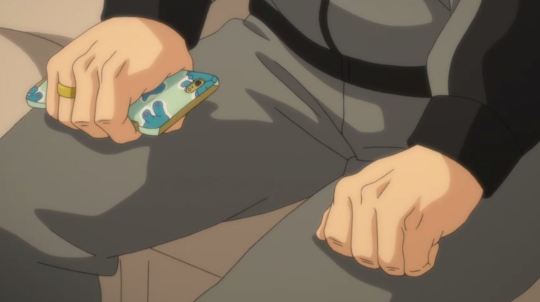
[Pictured: Yuuri Katsuki clenching his fists in an attempt to gather up the courage to ruin his own life for Victor's sake]
i.e. Cutting your own losses before you lose them.
So from the perspective of someone who also has low self-esteem and is in a relationship with someone who I think deserves much better, here's why I believe Episode 11 was necessary in a way that Episode 12 did not give justice to. Here we go!
You see, I have this tiny theory here about what Yuuri was thinking when he said those words that ultimately broke everybody's hearts. Everybody's been talking about it since the episode aired. But here I am, regardless, because I need to deposit these two cents of mine even though the account is already positively overflowing.
There's this belief I have, and I have no idea if this is just something that I have because I've been raised with an Oriental mindset or something specific to just me, but I'm afraid of being too happy. I believe I can only achieve a particular level of happiness; if I experience more happiness that I deserve, bad things happen. If I have too much, you bet your ass at least some of that will get taken away.
There needs to be balance in this world, or so I and many others believe — there is no shadow without light, and the moon has no meaning if she is not opposite the sun. Suffering and happiness? They go hand in hand. And in the same vein, there is no success without strife — and that's widely preached. But the opposite is also true; because there is no strife without success, and I'm willing to bet my non-existent balls that Yuuri and Victor are kind of the epitome of the latter.
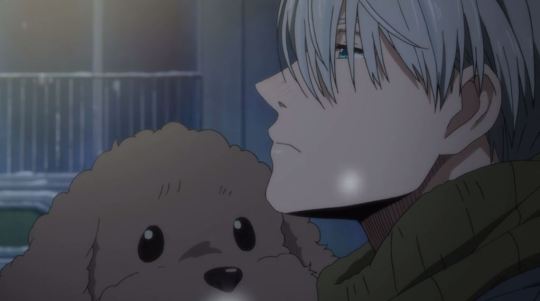
[Pictured: Victor Nikiforov before he met Yuuri Katsuki, i.e. incredibly lonely and trusting only a dog for providing him constant companionship]
And while Victor's end of the spectrum — his gold medals were the fruits of labor that his loss to life and love bore — were given their high-key focus in Episode 10, Yuuri's end of the spectrum was a low-key theme throughout the entire series. Yuuri's talents were paid with leaving his hometown and family to pursue an incredibly unconventional career choice, having the press hound him for every anxiety attack that he can't control, and bearing that enormous pressure of representing his entire nation on his shoulders — and his poor anxiety-ridden heart can't deal with that most of the time.
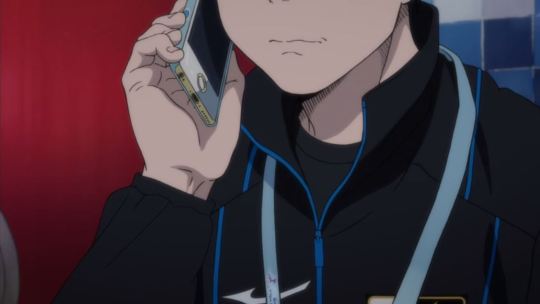
[Pictured: Yuuri Katsuki's mouth giving an involuntary wobble before he forces himself to smile for his parents' sake, also known as a frame that deserves more attention]
There's a stereotype for Asian parents: that if their child gets less than an A, it's a failure. It's a joke most of the time; for Yuuri, he applies that to his entire career as a competitive figure skater. Add the fact that he's representing the whole of Japan for one of the highest titles a figure skater can get, and the anxiety he's developed over the years, and you get a bundle of nerves on the best days — complete breakdowns at the worst.
Plus his dog died just days before, or maybe even during, one of the most important competitions in his life.
Oh, and he is an unbelievably sore loser.
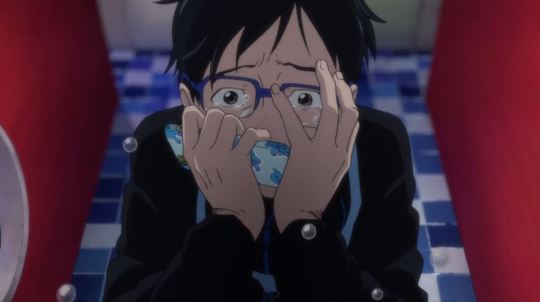
[Pictured: Yuuri Katsuki in that infamous shot of him breaking down in the bathroom; note that he only lets himself cry when he thinks that there is nobody around to see him]
And he's probably thinking i could have done better and he's probably thinking i guess i really should retire, but I propose that he's also thinking this is payment for all the other competitions i've won, isn't it? That he's thinking, this is payment for all the hardships i've put on everyone else. That he's thinking, oh well, i guess i deserve this after all.
It's like all the little bad things he's done over the years have finally come back to haunt him in one big smack of karmic retribution, right after the cruelties of fate have already given him a taste of what it felt like to be part of the winning team. Because don't tell me that Yuuri didn't feel this sense of pride, of fulfillment, of complete and utter joy when he was assigned to the GP Series and qualified for the Finals. That he didn't feel happy when he got the chance to train, abroad, with an actual coach and an actual rink despite just coming from small, seaside Hasetsu. That he didn't arrive at Detroit, wide-eyed and nervous but so young and hopeful, knowing that he was the JSF's certified top skater.
Then he lost at the GPF and he probably felt like all of that went moot. That all of a sudden, all his medals and trophies and successes didn't mean anything anymore. There's a reason why Minami was introduced, after all: to bring home the point that while Yuuri thinks he's an average skater, it doesn't mean that it's necessarily true.
It's further cemented by the fact that, when Minami says that his costume was inspired by one of Yuuri's older ones, he's mortified as he shrieks, "That's a costume from my dark past!"
Minami, bless him, talks back and says that Yuuri doesn't have a dark past to speak of. He's the actual cinnamon roll of YOI, guys. Imagine how happy he was when he cheered for Yuuri in the GPF in Yuuri's own house and saw, in person, all the trophies that Yuuri had been keeping in the background — and the fact that Yuuri even keeps them in the background speaks so much of his lack of self-worth that it deserves its own meta.

[Pictured: Kenjiro Minami, tears in his eyes as he screams out at his idol: You don't have a dark past! Don't make fun of me for looking up to you for so long and trying to catch up with you! — breaking our hearts in the process]
So, basically: if Yuuri had given all he had with skating, was rewarded with triumphs and successes only to feel like that had all been taken away when he was dead last at the GPF (and not to mention, he probably feels like all of this was justified); why wouldn't he feel that way about Victor?
Because Victor makes him happy. So happy, in fact, that his skating and confidence levels have reinvented themselves as a response to Victor's presence in Yuuri's personal life. Why wouldn't he think that Victor was too good to be true? Why wouldn't he be scared that the cruelties of fate would, once again, take away his source of happiness in a twisted form of giving balance to the world?
So he comes up with defense mechanisms. He blabbers in metaphor and dabbles in double-meanings (Episodes 1-3) and he feels so relieved that Victor seems to accept that it's just the way he prefers to express himself (Episode 4). But then he keeps falling and falling and he gathers up the courage to be more accepting of his past because of Victor (Episode 5), to be more bold for Victor (Episode 6), to be more couple-y with Victor. (Episode 8)
And ordinarily, that would be a good thing right? He's growing up! There's character development! He has more confidence now!
But YOI, god bless YOI, shows that anxiety doesn't just go away. It comes back to haunt you and when you're at your weakest, it strikes. This is best exemplified in Episodes 7 and 9, where it's glaringly obvious — but in Episode 11, it takes some understanding of the previous episodes to know that the entirety of the drama comes from Yuuri simply being an unreliable narrator again than from any actual basis.
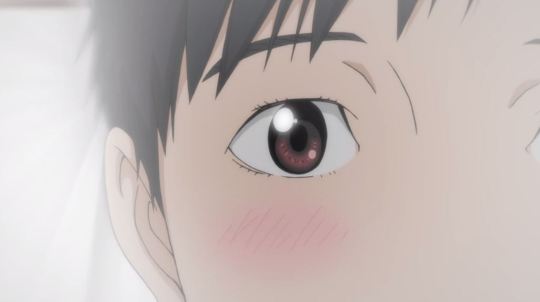

[Pictured: Two similar shots of Yuuri Katsuki from Episode 4 and Episode 11 respectively — the former, a happy blush as he prays give me Victor's time, if only just for now; the latter, horror dawns as Yuuri comes to the conclusion that Victor wants to go back to the ice and that their time together is ending]
Because Yuuri is the epitome of unreliable narrator, and Episode 10 was the ultimate peak of the mountain that YOI has been building from the very first episode — in an anime that opens with the self-deprecating protagonist reading articles about his loss, which is intentionally and deliberately set up to overshadow the fact that despite his loss he's still competing in one of the biggest competitions in the figure skating world.
The other thing that YOI has chosen to keep from us until Episode 10 was that despite the entire world being clamorous for him to go back to the ice, Victor actually . . . doesn't want to do that at all. He literally calls it a shackle on his neck. He waxes poetic about the life and love that Yuuri has given him, that he has neglected for so long. He gets kicked in the back and declared as dead by Yurio, and the most he does is mockingly crouch down and ask, did you want to compete against me?
Having Episode 10 come right before the massive fuck-up in Episode 11 was both an explanation and a warning: yeah, yuuri did all that and victor fell in love with him first. now remember how different things looked back in episode 1. because we're gonna go back to that in the next episode and y'all need to know what's real and what's just what yuuri assumes.
And the thing about Episode 10 is that it triggers this impulse to rewatch the entire series from Victor's perspective and contrast that to how different we saw it when it was just Yuuri's perspective we knew about. Doing that brings more impact to Episode 11, I think — which also highlights that despite Yurio found a friend, he still has some humility to learn and his arc isn't finished yet just because he managed to perfect Agape. While I do think he was being too mean (to a point that I considered it OOC, after Episodes 9 and 10), that's a different post altogether.
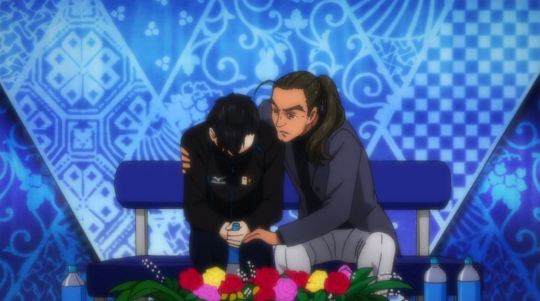
[Pictured: Celestino Cialdini comforts a sullen Yuuri Katsuki during the Sochi GPF; comes with Yuuri's monologue of I could never openly say that I'd win gold, but I never skated with the thought in my mind that I'd lose anyway]
I think that the way that Yuuri reflects to himself during his FS in Episode 9 echoes how he feels toward Victor. That despite never really admitting out loud that he wanted a gold, he never actually believed he would ever lose either — Yuuri let himself stay stagnant while tiptoeing between having the potential to be a winner and actually being one. In the same vein, Yuuri found himself walking that same fine line between being Victor's future and being Victor's has-been; someone between everything and something, but never actually nothing.
Yuuri let his anxiety get the better of him and he decided that being Victor's past would be best outcome he could ever hope to get. The events of Episode 11 have led him to believe that he would never be Victor's future; or at least, he would never be the future that Victor actually wants. And in Yuuri's twisted justifications, it would be a good thing that they would end their relationship after the GPF; it gives Victor the freedom to do whatever he wants and it gives the Yuuri the relief of not having delved deeper into the idea of them being an actual concrete relationship.
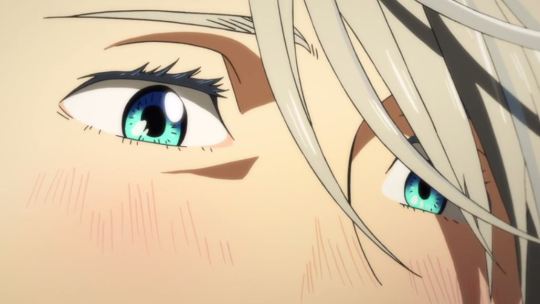
[Pictured: Victor Nikiforov, part of a newly discovered evolved species of humans called homo superior]
Except Victor, unlike Yuuri, has already considered the prospects of having a relationship without a time stamp and jumped right into it. Victor has already established in Episode 10 that he wants Yuuri, and that he would definitely choose a life without competitive skating specifically because it meant getting the love of a lifetime. Screw the consequences, he's getting what he wants and he will put every fiber of his being into nurturing this relationship that gives him all of the happiness that he never thought he could have.
He just never verbalized it. So while Victor gets the concrete proof that Yuuri wants him in the form of giving him the rings (although he does so in a way that implies he doesn't want to admit it), Yuuri doesn't.

[Pictured: Yuuri Katsuki, in doubt of where Victor's happiness truly lies: in a life with skating or a life without it]
Yuuri gets soft and sweet and cuddly Victor and it's enough to make Yuuri hope but it's not enough to help Yuuri understand that Victor truly wants him — how much Yuuri changed him. He knows the Victor that is, as Minako says in Episode 1, free with his charms and winks at the cameras and is touchy-feely with a man he just met; a Victor who was bored and had an impulse decision to coach him and ended up liking him. But the viewers get more insight into who Victor really was before he met Yuuri, who was sad and lonely and hollow — a Victor that fell in love with the boy with the drunken flamenco dance and was looking for an excuse to meet him again.
Victor, like anyone, wants happiness. Winning doesn't give him that anymore, but Yuuri does . . . even though he doesn't even grasp the true gravitas of the love they share.
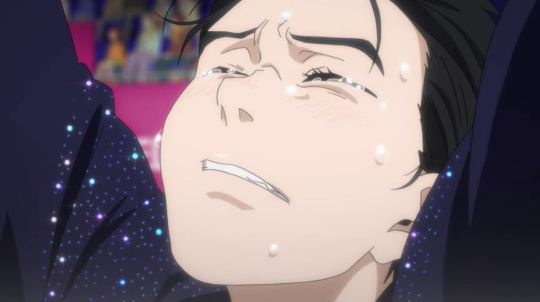
[Pictured: Yuuri Katsuki, in tears after an amazing Free Skate and the subsequent roar of triumph thereafter; a perfect representation of what we all felt in this scene]
Ultimately, what pissed me off about Episode 12 was that it seemed to betray its own protagonist. We had all the build-up to Yuuri winning gold and finally getting the concrete proof that Victor loves him back and that he is an incredible skater in his own right — because I wholeheartedly believe that the perfect ending to Yuri On Ice would be Yuuri getting gold and realizing that it doesn't matter. And for one moment he would look at all the people who have supported him endlessly and, instead of pushing them away in shame like he would have at the beginning of the show, he would thank them with a happy smile.
How Yuuri would learn not to equate his worth by his losses or wins was always a theme that I wanted the show to address in the Season 2 that I wanted to have, but for that to happen he had to win first in the S1 finale.
But he didn't, and the finale for one of the most popular animes of 2016 was done so cheap that it actually does render the entire anime into moot. So to say I'm disappointed? Yeah, well, that's kind of an understatement.
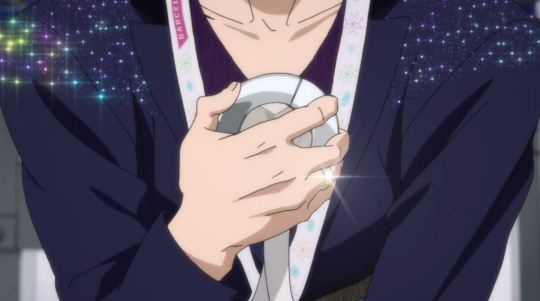
[Pictured: Yuuri Katsuki with the wrong medal]
#yoi#yuri on ice#meta#yoi meta#yuuri katsuki#i havent posted in tumblr for two years whoops#anyway have a meta about my precious boy because i love him dearly thank you#im having trouble uploading the screenshots hnggg what a shame#mine
50 notes
·
View notes
Text
Game of Thrones season 7 finale
Holy crap was it good. Damn that first set of scenes in the dragon pit and kings landing so amazing. Low key confirmation of Cleganebowl. the reunions Pod and Tyrion fucking Tyrion and Bronn and of course the Hound and Brienne bonding over their murder child Arya Stark. Brienne and Jaimes short little parts got me in the heart. Dany coming fashionably late on Drogon so extra so spectacular. The real stunner was of course Cersei and Tyrions scene was amazing. Peter and Lena were incredible in that scene. Cersei double crossing everyone I was like bitch are you serious. And then she loses Jaime I was like finally!
And of course one of my favorite moments was my Stark family getting revenge and justice! I was so worried they’d kill Arya. I’d hoped this was a ruse and it was! When she turned and said Lord Baelish I was living! The second he was dead I was thrilled and relieved. House Stark is not to be trifled with Littlefinger. You should have left the minute Arya came back because it takes more than words and lies to rip apart the Starks. I’m proud of the Stark kids.
I’m still salty we won’t get an Arya Gendry reunion or an Arya Jon reunion but I guess I can’t have everything. sighs
The whole Bran and Sam scene was just incredible to watch not just for the heritage reveal but also because both of these characters know so much and are incredibly intelligent. I hope we have more scenes with them because I enjoyed every second. Also I loved the theme that played throughout the scene it was beautiful. The wedding quite literally made me screech with glee because I’m a hopeless romantic.
Side note to the people complaining that Rhaegar was ugly or looked like Viserys? really...they’re brothers. Siblings usually look similar plus I think he was rather perfect but that’s my opinion.
Anyway moving on everyone seems to be freaking out about Jon and Dany having the boat sex. They are either thrilled or appalled. to the appalled people I must raise a brow. First they don’t know they’re related... Secondly this is far from the worst thing we’ve seen on game of thrones. It’s like oh so your morals come back now? With the consensual albeit incestuous sex? I don’t understand but hey we all have different opinions.What do I think? I'm kind of meh about the whole thing. It is kind of poetic though. Although I think them uniting would be smart politically. Plus it was the most tasteful sex scene I’ve seen on the show. No unnecessary boob or dick flashing. It was just two people coming together even though they probably shouldn’t. They were both on equal footing which was quite frankly refreshing especially for this show. But yes this will bite them in the metaphorical ass. It should be interesting how they handle the news of Jon’s true heritage and claim to the throne.
Another thing about the scene was Jon’s true name I was a bit confused about him being called Aegon because his half brother was called that. I don’t know who picked out the kid’s name but it is weird. It’s going to get real awkward in the afterlife. But I suppose it makes good drama or something. It’s poetic in a way historically and thematically. I think he should’ve been called Aemon or Jaeherys but I do not have the reigns on this one.
But all in all I really loved the whole scene it had this fantastic weight to it thanks to Bran’s commentary and the breathtaking music. It gave me chills.
The last thing of course is the WALL COMING DOWN. That was an amazing scene but we are fucked right now if people don’t get their act together. I just want to clap at them all and say it does not matter who fucked who, who killed who, who sits on the damn pointy throne IF EVERYONE IS DEAD! Y’all need to let it go and start figuring out a plan. All other squabbles should be set aside. Have an all-out war later for now focus on that army of the dead because they now have a dragon (not to mention tons of soldiers that include fucking giants.) Jon and Davos have been saying it since the beginning the only war the only thing that matters is the threat of the army of the dead. The war for the dawn has begun again. Winter has come.
2 notes
·
View notes
Text
Vivienne Vitale (Shi) Questionnaire
does your character have siblings or family members in their age group? which one are they closest with?
Vivi is an only child. While she was a toddler, she wanted a younger sibling. However, as she grew older, she was extremely satisfied being an only child.
what is/was your character’s relationship with their mother like?
Vivi and her mother get along great. Her mother was almost always working and Vivi had always wanted to help. After all, her mother’s job was part of the reason behind her Ultimate Ability.
what is/was your character’s relationship with their father like?
Her father often makes a lot of dad jokes, but they are greatly appreciated by Vivi. Part of her punny humor was inherited by him, in fact.
has your character ever witnessed something that fundamentally changed them? if so, does anyone else know?
When she was a child and found the dead body in the park, it had completely changed the way she viewed death. She was absolutely fascinated by it and wanted to learn more.
on an average day, what can be found in your character’s pockets?
She usually carries around her keys, wallet, perfume, chapstick, makeup, and embalming fluid.
does your character have recurring themes in their dreams?
She mainly has dreams about being revered and admired from all around. People give her flowers, give her jewels, and so on and so forth.
does your character have recurring themes in their nightmares?
She has nightmares where she can feel pain, but only for a moment. And it is so goddamn painful, she feels lucky for just a few moments that she has congenital analgesia.
has your character ever fired a gun? if so, what was their first target?
Yes. Her mother took her to the shooting range a few times when she was younger to help teach her self defense. “Sometimes, only a bullet can stop somebody,” her mother would say, “Not even their own morals or humanity can stop them.”
is your character’s current socioeconomic status different than it was when they were growing up?
Not at all. Vivi’s parents were middle to high class and she’s still in that range. She lives quite nicely.
does your character feel more comfortable with more clothing, or with less clothing?
Vivienne is comfortable in absolutely any amount fo clothing. She does prefer less clothing, but her profession requires her to wear a conservative amount of clothing.
in what situation was your character the most afraid they’ve ever been?
Shi was the most afraid during her execution. If the morphogenetic field did exist, then everything she’s based her life around has been a lie. And if it didn’t exist, she would not get another shot to live her life and be as successful as she would like.
in what situation was your character the most calm they’ve ever been?
Always performing autopsies and dressing the bodies. Seeing somebody who’s soul and mind no longer exist, who’s energy has come to a complete stop, helps her.
is your character bothered by the sight of blood? if so, in what way?
She is so laughably unaffected by the sight of blood that she’s actually kind of fascinated by it. Even when she bleeds, she never really notices it due to her condition. Somebody must point it out to her, and she is clueless. That only makes her a slight bit scarier than she already is.
does your character remember names or faces easier?
She remembers names better and will often confuse people. i.e. Fujita and Hawkbit
is your character preoccupied with money or material possession? why or why not?
Yes. Vivienne loves making money and owning material possessions. It makes her feel confident and deserving. And most of all, powerful.
which does your character idealize most: happiness or success?
She idealizes success more. While she loves being happy, she would rather have the recognition.
what was your character’s favorite toy as a child?
Her Operation game. She would intentionally touch the sides of the metal to buzz her so she could feel the shock sensation, but never any pain.
is your character more likely to admire wisdom, or ambition in others?
She admires wisdom, surprisingly. Although Vivi does admire ambition, she belives that life is pointless and we all die in the end anyways, so you might as well die learning as much about life and the world as you can.
what is your character’s biggest relationship flaw? has this flaw destroyed relationships for them before?
Vivi isn’t very empathetic nor can she feel pain, so she doesn’t really get it. She’s odd and boisterous and can drive people away by how eerily calm she is about death and her nihilsm. This has ruined a few potential friendships she had tried to blossom.
in what ways does your character compare themselves to others? do they do this for the sake of self-validation, or self-criticism?
She’s pretty vain and does it for the self-validation. Vivi thinks very highly of herself and often finds herself judging people on a scale of 1 to Vivi and if they happen to rate above herself or equal to herself, she tries to be friends with them.
if something tragic or negative happens to your character, do they believe they may have caused or deserved it, or are they quick to blame others?
If something tragic were to happen to her, she would probably blame whatever were the cause of it. She doesn’t believe in fate or divine intervention. Her view is just that shit happens.
what does your character like in other people?
She likes their knowledge, uniquity, and appearances. If they are rather smart, she’s more likely to bond with them and respect them. If they are strange or different, she takes an immediate interest. If they are aesthetically pleasing to her, she will try and make a connection. She also greatly admires people with a sense of adventure and mutual interests. (i.e. Queen fit all of these categories)
what does your character dislike in other people?
She dislikes highly religious people and people who can’t take a joke. She also doesn’t like when people chew with their mouth open. Another pet peeve of hers is people who believe in the paranormal (i.e. Athens).
how quick is your character to trust someone else?
Not really at all. She has to get to know them and assess and analyze their personalities and actions to come to a conclusion as to if she can trust them or not. She knew she couldn’t trust Queen but she did trust Justice.
how quick is your character to suspect someone else? does this change if they are close with that person?
Vivi is moderately quick to suspect. She tries to come to a logical conclusion about that person and if their actions and reactions line up with the possibility of the suspicion. If it’s some she’s close with, she still remains objective but doesn’t look quite as hard.
how does your character behave around children?
Vivi has no idea how to behave around children. She has learned that it’s not really socially acceptable to discuss the concept of death and nihilism with them and she finds how annoying children can be. She admires their curiosity and wonder but finds them incredibly unsatisfying due to how little they know and can do.
how does your character normally deal with confrontation?
She will straight up discuss it with them. She’s not one for tact or subtlety.
how quick or slow is your character to resort to physical violence in a confrontation?
Vivi is usually slow to violence. She doesn’t like being violent unless it’s necessary. However, she absolutely would resort to violence and has.
what did your character dream of being or doing as a child? did that dream come true?
Originally she wanted to be just like her mother and be a detective. She wanted to major in Criminal Justice but had a change of plans once she discovered the dead body in the park. That’s when she just knew she had to be a mortician.
what does your character find repulsive or disgusting?
She finds older men preying on younger girls disgusting. Also people who abuse others or people who chew with their mouth open.
describe a scenario in which your character feels most comfortable.
content warning: autopsy scene
“And let me hit him in his back, Frank White needs to get spanked right, for setting traps, little accident murderers,” the young woman rapped as she took the sheet off of the body and inspected it closely.
Her blue eyes scanned for any bruising, fingerprints, unusual marks. As she scanned, she recorded on her chart the victim’s name, height, age, etc. “Tsk tsk, I bet she was beautiful when she was alive, but she sure looks more peaceful now, I bet,” she muttered, pen between her teeth.
Not noticing anything out of the ordinary besides a few bruises, she conducted an X-ray on the entire body, you should never neglect the dental bits.
She continued to hum along to 2Pac’s “Hit ‘Em Up” as she took blood samples and slid her scalpel down the body. She breathed a sigh of relief. Some blood seeped out, but never spillng like blood did when you were alive. After all, if you’re dead, your heart stops and can’t actively pump blood out as it does when you’re alive.
As she finished the autopsy, she smiled.
describe a scenario in which your character feels most uncomfortable.
“Okay but the morphogenetic field allows us to transfer our consciousness, essentially!” Mills spouted excitedly.
“Okay, I’m sorry but like, what did you just say about that ‘morphobanana field’?” Shi said, confused.
“Oh, sure. So with espers, they can transfer their consciousness, when they die, thanks to the morphogenetic field, which takes them to another timeline. So essentially, you could start over!” he grinned excitedly.
Shi’s brows furrowed. “Uh, no? When you die, you die. That’s it. It’s not possible for something to happen to you after you die. I would know, I like, you know, work with death.”
Mills giggled. “Shi, you’re funny. I know this might be a shock to you and like it doesn’t seem real, but I assure you it absolutely is.”
Shi shook her head. Mills was the Ultimate Academic Prodigy and she respected his knowledge. He wouldn’t lie to her, that just wasn’t in his nature. And he was an incredibly intelligent boy.
What the fuck is happening, Shi thought. How can everything I have learned and lived for just been shit on by this theory???
Shi sat there. When you die you die, and that’s a lie. She had to re-shape her whole way of thinking and her view on life. And that she was not happy about.
in the face of criticism, is your character defensive, self-deprecating, or willing to improve?
Vivi can be very self-defensive only because she thinks very highly of herself. After initially being defensive, however, she will reflect on the criticism and assess herself to determine if the criticism is legit or not.
is your character more likely to keep trying a solution/method that didn’t work the first time, or immediately move on to a different solution/method?
She will immediately move onto a different solution or method. Obviously if it didn’t work the first time, why would you ever try that again?
how does your character behave around people they like?
She cracks jokes and gets in ther face and is touchy feely. She’ll show you respect and be more hospitable to you. She won’t mind sharing with you or hanging out with you.
how does your character behave around people they dislike?
Vivienne will usually be very blunt when it comes to that. She isn’t afraid to call people out or outright say she doesn’t like them.
is your character more concerned with defending their honor, or protecting their status?
Shi is more concerned with protecting her status if she had to pick from the two.
is your character more likely to remove a problem/threat, or remove themselves from a problem/threat?
She is more likely to remove herself from that threat. She doesn’t need drama or her life to end earlier. However, if it was life threatening, she wouldn’t hesitate to end the issue.
has your character ever been bitten by an animal? how were they affected (or unaffected)?
Animals usually tend to take a liking to Vivi, oddly enough. She’s never been bit by an animal. Even if she was, she couldn’t feel it which could potentially be dangerous.
how does your character treat people in service jobs?
Completely objectively. If they do well, she tips nicely. If they don’t do well, she still tips, but not as greatly.
does your character feel that they deserve to have what they want, whether it be material or abstract, or do they feel they must earn it first?
Vivienne feels that she deserves to have what she wants. She’s the Ultimate Mortician, after all. She can’t feel pain. She works hard and is good at what she does. Why shouldn’t she get what she wants?
has your character ever had a parental figure who was not related to them?
Nope. She just had her parents which she got along great with.
has your character ever had a dependent figure who was not related to them?
Nah. Vivi doesn’t like too many people. However, she did become close with Effy during the Nonary Games and often acted as a sister or mother towards her.
how easy or difficult is it for your character to say “i love you?” can they say it without meaning it?
It’s pretty hard for her to say it seriously. She doesn’t feel any romantic attraction.
what does your character believe will happen to them after they die? does this belief scare them?
Originally, she had believed that once you died, you died and that was that. No afterlife, no nothing. You just simply stopped existing. However, after learning about the morphogenetic field, she learned that your consciousness would transfer. The morphogenetic field terrifies her because it conflicts with everything she’s ever believed.
1 note
·
View note
Text
My Chilly Opinion on Blizzard Story Telling
I recently picked up the book Starcraft Evolution. I’m not sure what possessed me to do so, since books based on video games have rarely been anything more than a cheap popcorn book. To be fair, it was mildly entertaining, if somewhat hollow. More importantly, it made me want to replay Starcraft 2…or at least the Protoss campaign.Around this time I was also resubbed to World of Warcraft, as well going back and replaying Diablo 3. So here I am, neck deep in Blizzard games, and it made me really realize something about them as a company.
I should preface this by saying that I love Blizzard. I’ve put countless hours into Warcraft 2, Warcraft 3, both Starcrafts, and have been subbed to Wow since 2005 (although granted I just unsubbed again but my point remains.) They produce gorgeous games, with wonderful character designs, incredibly deep, intricate gameplay, and they have produced, without a doubt, the best looking cinematics in gaming history. That being said, they tell some of the most bland, generic stories since Bubsy 3D.
Playing all three of these games around the same time really showed me just how lackluster the stories are. In the original Starcraft, you had a number of interesting, diverse, and multi faceted characters. Mengsk may have been a bastard, but he was a man on a revenge mission who would do anything to right the wrongs done to him. The Protoss were an enigmatic race, and while they were xenophobic and prejudice, but they also had a side of honor and strong sense of justice. We had varied characters and races with their own motivations. It was interesting and it was fun.
Beating Starcraft 2 was a very melancholy experience for me. Firstly, with all three campaigns, I would say close to half of the missions felt like filler. They did little to actually push the plot along, and I couldn’t find myself invested in the objectives. I wasn’t placing a Psi Emittier to wipe out a planet, I wasn’t protecting a chrysalis that housed the soon to be queen of blades, I wasn’t hunting down the traitor Tassadar. Each mission in the sequel may have made sense in the frame of itself, but in the overall picture, they were very flat.
My biggest problem however, comes at the end of Legacy of the Void. Gone are the intricacies of character growth, development, and motivation. Instead we are greeted with a very generic “big, bad, powerful guy wants to destroy the universe” plot. I remember the emotion that went into the final battle of the original Starcraft, and while the Overmind may have been similar in it’s motivations, looking deeper it did go beyond the destroy the universe trope. In addition, we went from Starcraft to Magiccraft. It felt like we had gone beyond the loose science that the universe had established to something much more steeped in magic and fantasy. I like fantasy as much as the next guy, but this is not where it belonged. Science Fiction is, in my opinion, not the place for prophecies and chosen ones.
Next I’ll take a much briefer look at Diablo 3. The game is fun as Hell, pun absolutely intended. They story however, after a full playthrough, leaves much to be desired. Let me start by saying that I’m not asking for Diablo to have a tragic backstory where his mother never hugged him, and a stranger stepped on his favorite flower, but when every villain in the game spouts the same “I will destroy you! I am Evil!” rhetoric, they all blend together, and the threat becomes that of a whimpering child. The story boils down to little more than, “here are these totally evil people who say generic evil things, go kill them.” It gets old. I may be over simplifying parts of the game, but this, I feel, encompasses the majority.
World of Warcraft. Man, I could write thirteen articles about this game alone. I’ll try to keep it brief and focus on, what I feel, is the major problem here. Lack of tonal stability. Lack of consistency. Lack of following its own rules. The game and it’s story was fine up through Wrath of the Lich King, and even parts of what I consider one of the worst expansions, Cataclysm. I, more than anybody, am all about character development. It’s what makes a good character, and a good story. But the Blizzard writing has been so inconstant, that you can’t wave it off as development but just bad writing. This is most prevalent in the characters of Jaina and Garrosh, both of who follow similar arcs. The key point is that they change characteristics drastically and suddenly. Yes, I understand that Jaina had to deal with the bombing of Theramore, but to see her fight so hard for peace between the two factions through thick and thing, only to have this be the turning point is frustrating. Not only that but the extent to which she changes spectrum felt very out of character and very forced. Garrosh too, went from a coward, to a leader, to a homicidal, xenophobic maniac very quickly, with seemingly little provocation.
The feel of the story itself has changed drastically. This is a story that started off as Orcs versus Humans. Then it went to fighting the undead, then to demons, old gods, extraplanar beings, entire worlds. It exploded too big too fast. The problem with telling a story through and MMO medium is that the developer may feel the need to make bigger and badder threats, but by doing so in the way that Blizzard has, the story, I feel, has suffered greatly. We don’t feel like heroes on the battlefield anymore, but rather super powered laser Jesuses flying through space. As I said, tonal change.
I could say much more about each game and their story failings, but I don’t want to beat a dead horse, or I may take a more in depth look in future articles. I just want to repeat that I by no means think that Blizzard produces bad games. I love their games. They make some of the most enjoyable gaming experiences available today, and I hope they continue to grow and flourish. I just hope that as they do, they work on bringing their stories to the same level as the rest of their experiences.
0 notes
Text
Phoenix Wright: Ace Attorney – Spirit of Justice
WARNING: I AM NOT A PROFESSIONAL GAME REVIEWER, GAME CRITIC, OR WRITER. The following is just purely my opinion and reaction to the game. Also, ENGLISH IS NOT MY FIRST LANGUAGE. So, yeah, I’m sure there will be a grammar mistake somewhere there. Please don’t be a grammar nazi. Lastly, THIS WILL NOT BE AN ENTIRELY SERIOUS REVIEW. Yay. *insert cute puppy face*
DISCLAIMER: I DO NOT OWN ANYTHING. The games I am reviewing belong to their respective owner(s). I DON’T GAIN ANY PROFIT FROM THIS, EITHER.
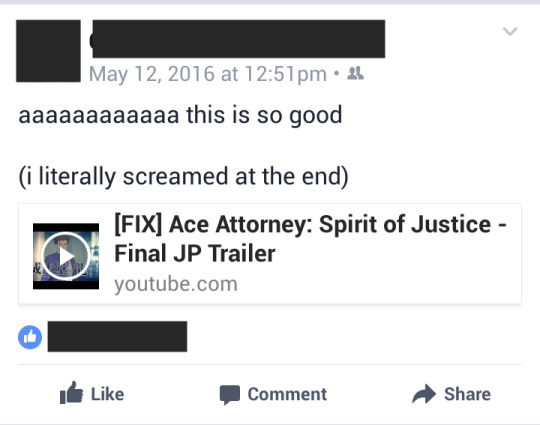
seeing your previous player character on the other side of the courtroom would make anyone scream
Okay, first, let me lay down some rationale for this game. The Ace Attorney franchise is really, really close to my heart. If Pokemon holds my past and my childhood, the Ace Attorney holds the key to my future – as dramatic as it sounds. The Ace Attorney is what pushed me to take the path of being a lawyer. Of course, it’s not the whole reason (I’m not too keen on putting my whole life and future over a single game, after all), the other is the desire to change all the stupid things that is happening around me. But still, it is what introduced me to the greatness of law, the importance of finding the truth, and the great feeling of satisfaction you get once you have found it.

note to self: don’t fangirl too much and read the important details. seriously.
CHARACTERS:
The Legend, Phoenix Wright
Let me say one thing, it’s really, really weird facing Phoenix in a courtroom battle. For five games, I’ve played as him, and then suddenly we’re battling against him as Apollo in a civil case!? I mean, we all anticipated it ever since we briefly controlled Edgeworth in Trials and Tribulations and acted as a Defense Attorney, but seeing the legendary Phoenix Wright on the other side of the courtroom is still surprising.
And scary. Definitely scary. Seeing Phoenix frown seriously, smirk and do a complete turnabout (which, normally is a good thing for us since we’re normally him) made Apollo (and us, the player) really quake in his boots. It’s like he’s getting back for all the abuse he received for being the butt monkey of the courtroom for the past 4 games!
Other than the very memorable Case 4, Phoenix goes back to being on our side again for the rest of the cases. I especially love the fact that even though 8 or so years has passed; Phoenix’s protectiveness over Maya has never failed. He went to another freaking country just because of a phone call for her! He fought on the wrong side of the truth (which is basically the opposite of his whole values) for her! He knowingly risked his life over her (though then again, this part’s nothing new)!
Every girl needs a Phoenix in her life, man. (NaruMayo ship: *sails*)

serious!Phoenix would make anyone tremble
Courtroom Revolutionaire, Apollo Justice
Okay, first of all, let me clarify; I KNOW THAT THIS TITLE BELONGS TO ATHENA. But it just fits, you know? (Also, I don’t know how to spell.)
I don’t care that the title of the game says Phoenix Wright: Ace Attorney; Apollo is the real star of this game (it’s like the reversed version of Apollo Justice: Ace Attorney, where the real conflict is about Phoenix.). I believe in the wandering fan theory that this last three games (Apollo Justice: AA, AA: Dual Destinies, and AA: Spirit of Justice) is about Apollo, similar to how the first three games (Phoenix Wright: AA, AA: Justice for All and AA: Trials and Tribulations) is about Phoenix.
And man, how those three games did a wonderful job building up Apollo into the brave little bird he is now. AJ shows how he starts as a rookie defense attorney, DD shows his high school-college past (aka Clay MY GOD *eternal crying*), and lastly, SoJ shows his childhood and ends in how he starts being a professional defense attorney (thus, making a complete, albeit reversed, circle).
Spirit of Justice shows a lot of tearjerker, heart-pulling and gasp-inducing scenes for Apollo that at this point in time I don’t know how he managed to not break down. Oh wait, he did break down, he even have a new, special animation for it. And my god that scene… I didn’t shed a single tear at that point, because I was just so horrified and overwhelmed and whatishappeningisthisreallyhappening. Yeah, that feeling. (I did cry, a lot, but at the later point of the game since it took time for my mind to acknowledge that ohmyggoditreallyhappenedhuuuHUHUHUHU-)
So yeah. Apollo really received his most-deserved characterization and development in this game.
The Funeral Prosecutor, Nahyuta Sahdmadhi
Nahyuta. Nahyuta… Is my baby. Because, really, he’s just so cute and naiive in some of the things! I mean sure, he’s really nasty, but so are the other prosecutors and you don’t see me hating on them (in fact Franziska is totally my role model). But we can’t all deny the fact that he’s really kind and gentle on other people, look at Ema for instance (it’s clear that he likes her btw, I just can’t decide if it’s platonic or romantic, since my KlEma heart’s really against it).
And just like any main prosecutors in any games, Nahyuta receives wonderful characterization and character development as the game progresses. Similar to Apollo, a lot of tearjerker scenes is about him, especially when you discover how much has he sacrificed for his family…
And Nahyuta’s totally an overprotective brother to Rayfa. I can’t wait to see the next game just to see their post-game interactions.

look at this two original assistant babies turning to mature babies
The Ace Assistant, Maya Fey
MAYA. SHE’S BACK. AAAAAAAAAAAAAAAAAAAAAA-
Ace Attorney fans have fully risen from the dead the moment the trailer showed Maya returning for this game. It’s what we have been wishing for in these past two games! Our beloved Ace Assistant is back! And partnered with Phoenix no less! Sarcastic conversations! Funny interactions! Ladders vs. Stepladders!
Our original Ace Attorney duo is back! AAAAAAAAA-
But still, of course 8 years have passed, so it’s inevitable for Maya to change. Even though most of the time she’s still childish and funny, there are still many scenes scattered all around the game that shows her all grown up that you can’t help but remember her older sister, Mia. The game shows Mature Maya, the Leader of the Kurain Village.
Also, the Spirit Channeling scene is very, very beautiful. I’m glad that we actually saw it for the first time.
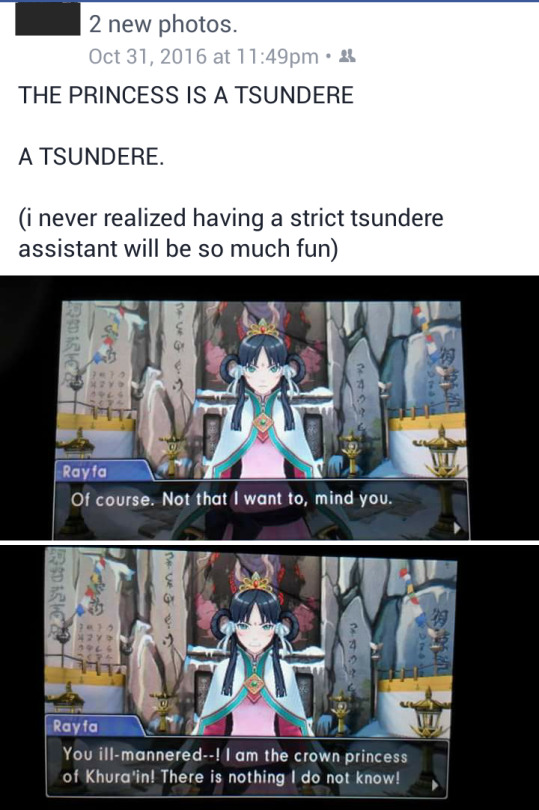
lil’ princess is just so cute!
The Priestess, Rayfa Padma Khura’in
Princess Rayfa is a cinnamon roll. A tsundere cinnamon roll, and that what makes her a very cute and wonderful and funny assistant.
Serious talk though, Rayfa is the youngest (except for Ahlbi) character to be introduced in this game, and it shows. Although she acts all high-and-mighty and incredibly mature due to her status as a priestess, there are times that her childishness shows true. And I think it’s completely okay – and Phoenix and Maya does to. She tries too hard to immediately grow up , but what she doesn’t know is that being true to your age gives you wonders too.
And, oh god, the pressure given to her by her mother… I can totally relate.
That scene when she was asked to show her (adoptive) father’s death in a Divination Séance… it made me cry for Rayfa [seriously, this game made me cry a lot]. Sure, we’ve seen her faint a lot of the times, but it’s only for dramatics; to show how horrified she was that we beat her. But that scene… is the real deal. We actually saw Rayfa going pale, gasping for air, eyes wide… and faints. It’s – just – so heartbreaking…

can we all just cry
The Dragon, Dhurke Sahdmadhi
Oh my gosh, where do I even start.
*cries*
My first impression of Dhurke during the trailer was he’s the typical rebel antagonist in a game. And it continued on as we first got a glance on him at the end of the second trial.
Oh boy am I glad to be wrong.
I admit – Dhurke has not been a particularly good father to Apollo. Sure he’s got his reasons, being busy with the rebellion and all, but imagining a little Apollo hoping for his father to show up, pick him up and get him out of his misery – yet incredibly devastated as later, he will know that no one will show up, really broke my heart. Apollo did not deserve that. No child deserves that.
But oh man, he still loves Apollo. He loves Nahyuta. He loves Rayfa. He loves his children – anyone playing the game can see that. He just shows it in a different way, but every action he takes – it’s for the sake of his family. (Nahyuta really is similar to his father)
SPOILER
Too bad he’s not even alive. I can’t believe all the time we’ve spent with him as Apollo is… not exactly a lie, the interactions with him is the truth – he loves Apollo. But… you know.
Imagining his thought process while he was being spirit channeled by Maya and spending time with his son he had only seen now for the past two decades… is very depressing.
The Childhood Duo, Athena Cykes and Simon Blackquill
I admit, I am disappointed with these two. Well, not these two exactly, they’re perfect just the way they are (I MEAN CAN YOU BELIEVE IT SIMON AND ATHENA TEAMING UP. THE PSYCHOLOGY CHILDHOOD FRIENDS, DEFENSE-PROSECUTOR DUO IS TEAMING UP AAAAAA-), but I’m more sad in the roles they are given. More specifically, the wasted potential of their roles.
The theme of the whole game is inheritance. Inheritance from parent to child, and inheritance from teacher to student. And Athena and Simon’s ace – Psychology – is literally that, an inheritance from Metis Cykes!
They don’t need to create a whole batch of other characters. I’m not saying the Rakugo case sucks – it’s very new considering we have another Japanese culture-themed case; and the fact that a psychological disease (the multiple personalities stuff) is the main turning point of this case makes it a perfect case for Simon and Athena – but maybe they should have used it for the next game?
Athena and Simon were only introduced in the last game – so I’m definitely hungry for more backstory and deeper characterization for these two wonderful characters. And what better way for us to get to know more about theme more intimately than to get to know these two’s most important person, Metis Cykes, and her gift to them?
But hey – I’m complaining but I’m not particularly shunning these two and Case 3. As I said, Case 3 is a wonderful and genius case (but what would you expect from Ace Attorney, right?). It’s just that, the potential…
The Game
So far, this game has the largest amount of ‘gimmicks’ or ‘powers’ featured. Phoenix’s Magatama, Apollo’s bracelet, Athena’s Widget, Ema’s Forensic stuff, and the newly introduced Rayfa’s Divination Séance. I think the only missing power is Edgeworth’s Logic Chess, and we have the complete set!
Each of them is unique and special in their own way, and they definitely made the game much more exciting and enjoyable. OF course, the traditional courtroom battle is as hard, mysterious and exciting as ever! I cannot even predict who the culprit was in the start of the case, and if it was obvious who did it (like, it was showed in the initial cutscene or was directly implied), I can’t figure out how he/she did it without the help of the character I’m acting as. Which is a new thing for me, since in the past games, I already know who the real culprit is even before the player character knows. Well, most of the time, at least.
And the plot, oh the plot was absolutely complicated and mind blowing it’s wonderful. The family drama is as – if not more – dramatic than the T&T one. And that’s saying something, considering that the Fey clan’s story is really complicated too. And as I mentioned earlier, this game gave meat for the characterization of several characters.
Also, it made me cry probably around ten times.
FINAL REMARKS
DO I EVEN HAVE TO? GO PLAY IT. Though if you still haven’t play the previous games yet, do that first THEN PLAY THIS. THE STORY IS GOOD. THE GAMEPLAY IS AWESOME. THE CHARACTERS ARE WONDERFUL. *eternal scream*
FINAL NOTES: I’M SORRY IF I MISSED ANYTHING. What I wrote here are the things that really stood out to me. My aim is not to review everything about the game, but to write what I remember the most and what my reaction to it. If I did react to the whole game, it would take about 20 pages or so in MS word. (This is 4 pages, btw)
2 notes
·
View notes